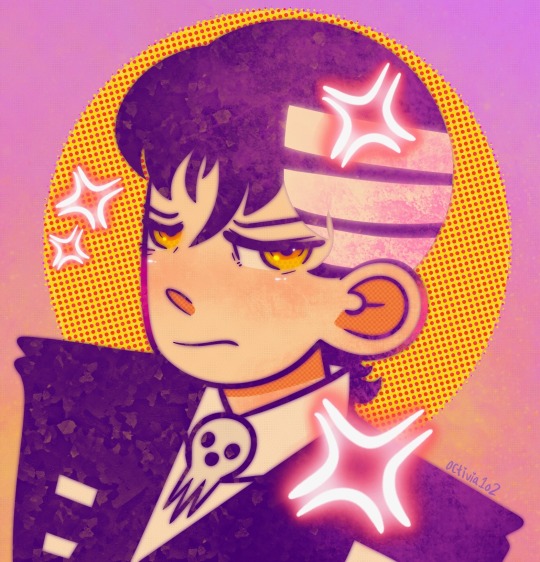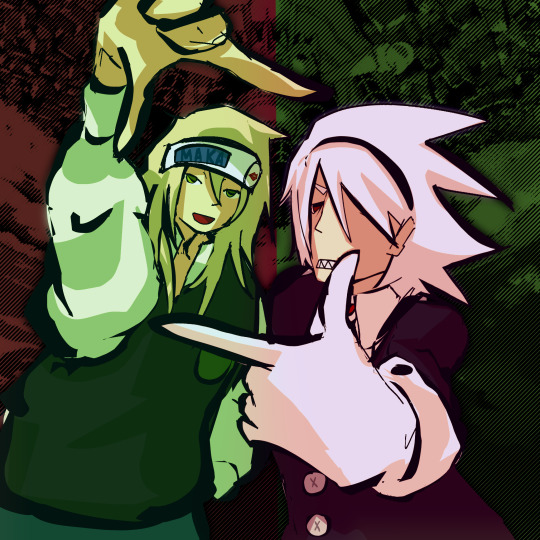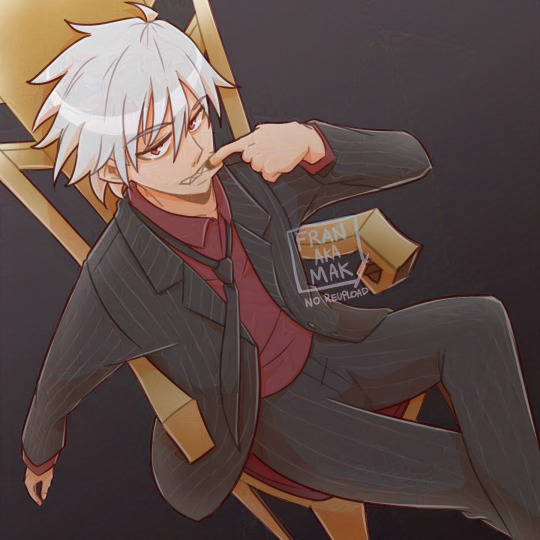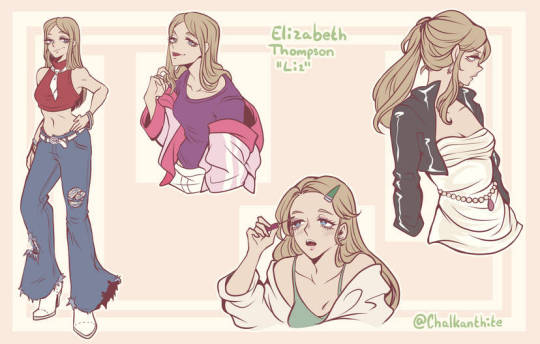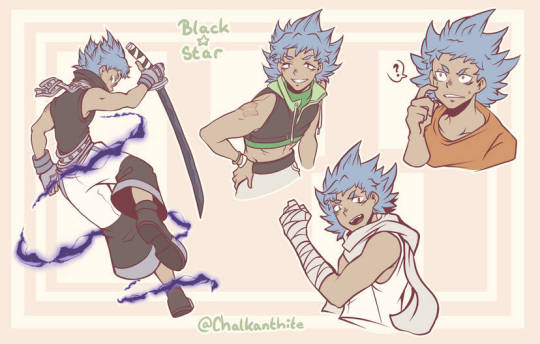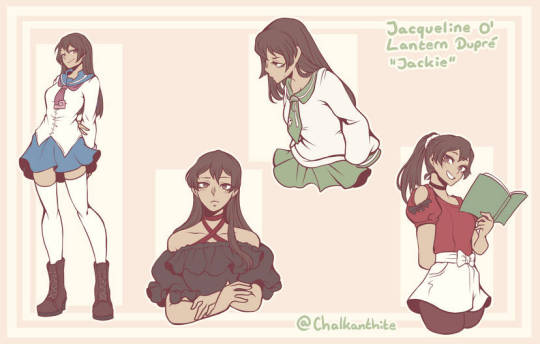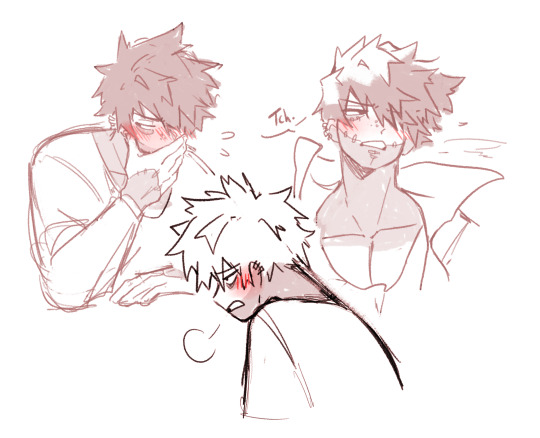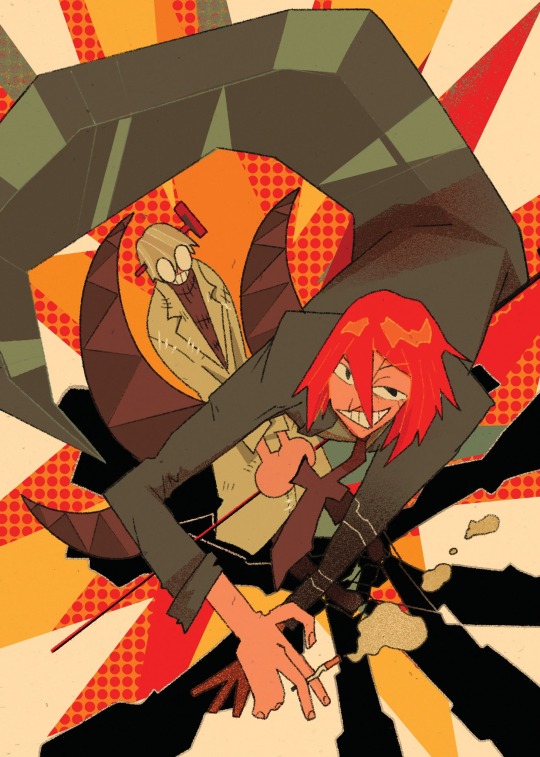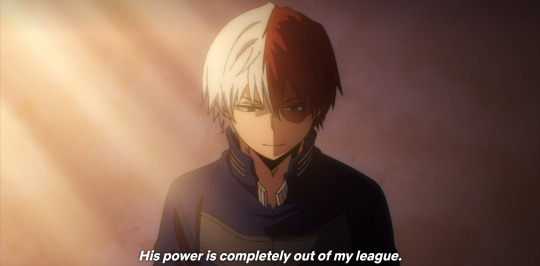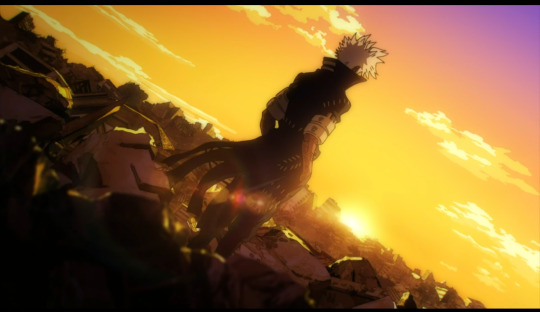Text
How the Todorokis call each other (Part 1)
So since I researched for it for my fic here are a bit of the words the Todorokis use to call/talk about themselves and each other in the Japanese manga (occasionally comparing it with the English translation).
Note that I won’t report names that are too general (when one of the children talks of them as his father ('chichi' 父) or his mother ('haha' 母) or when they refers to their family ('kazoku' 家族) and that sometimes, in English, the characters seemed to call someone in a certain way but the same didn’t apply in Japanese.
In order to make things simple I’ll group the characters when a Japanese term is used multiple times, so as to explain what it means only once. In part 2, as well as ending with the list of ways they call each others, I’ll put a summary for each character, so that if you want to know what a specific character use, you can do it more quickly.
Just remember the Todorokis, being a family, tend to use casual speech to talk among them, so they use many words which would be rude if they were to use them with other people but which are perfectly okay between family members. Also in the Japanese family hierarchy, Enji is above his children and wife, Rei is above her children and, in regard to the children, older siblings are above younger siblings.
It's worrth to say I’m not Japanese. The explanations of Japanese terms come from me reading plenty of Japanese dictionaries and grammars but I might have done mistakes or missed something... or missed some way the Todorokis used to refer to each other (as there's actually plenty of quotes). Consider yourself warned and feel welcome to write me if you think I missed something.
HOW DO THEY SAY “I”
Ore (俺/おれ Lit. “Oneself”)
In normal situations all the Todoroki males use ‘ore’.
This term is the most casual form of self-address used by men, which establishes a sense of masculinity. It can be seen as rude, depending on the context, as it’s suitable for conversations among close friends or relatives but not in polite conversation. It emphasizes one’s own status when used with peers and with those who are younger or of lesser status. Among close friends or family, its use conveys familiarity rather than masculinity or superiority. It was used by both genders until the late Edo period and still is in some dialects.
It’s notable how Tōya used ‘ore’ even before Natsuo’s birth so when he was 4 or younger (Natsuo was born after he turned 4). Very likely, despite being so young, he was copying his father’s speech pattern.
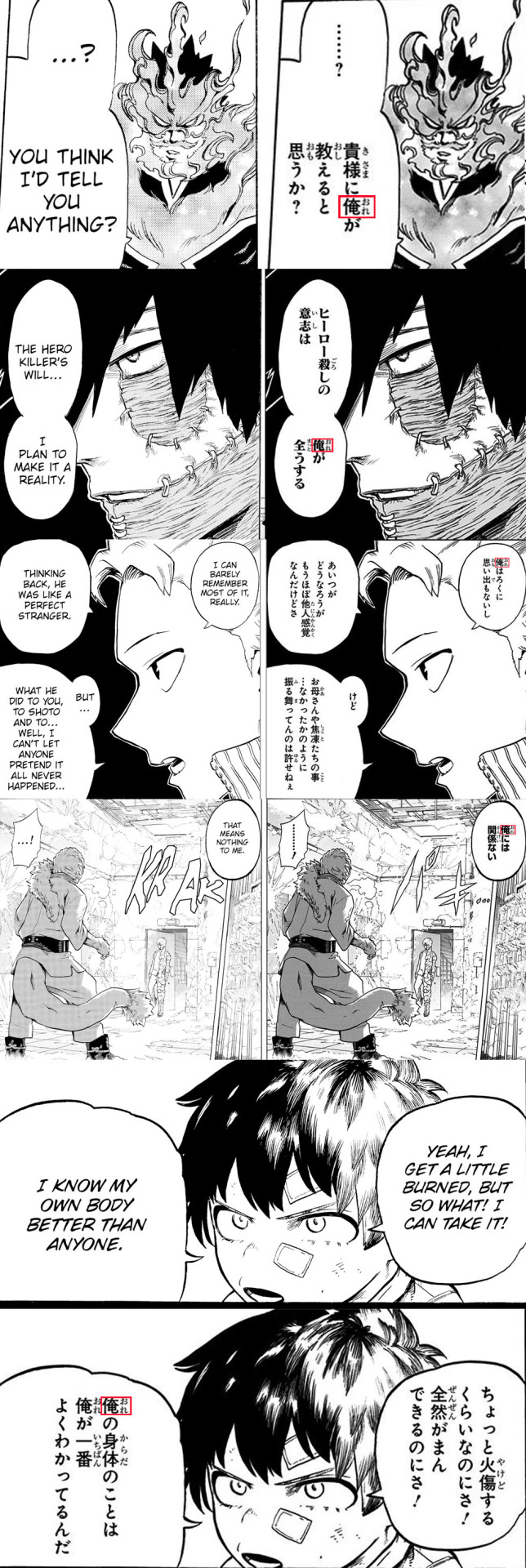
Watashi (私/わたし Lit. “One own person”)
If the male Todorokis use ‘ore’, the female Todorokis use ‘watashi’.
Don’t mistake ‘watashi’ for a female only way to say “I”. Only in casual speech, it is typically only used by women because if used by men in casual context it may be perceived as either stiff or feminine however, in formal or polite contexts, this is gender neutral (for example All Might uses it, his catchphrase “I am here” in Japanese is ‘watashi ga kita’ 私が来た lit. “I have arrived”).
That’s also why in chap 306, when speaking with the press, Enji switches to ‘watashi’ so as to sound as polite/formal as possible (before switching to ‘ore’ again when he tells them to watch him) and, in the anime, they also had him use ‘watashi’ in episode 46 when he answered to the phone so as to convey he was being formal/polite.
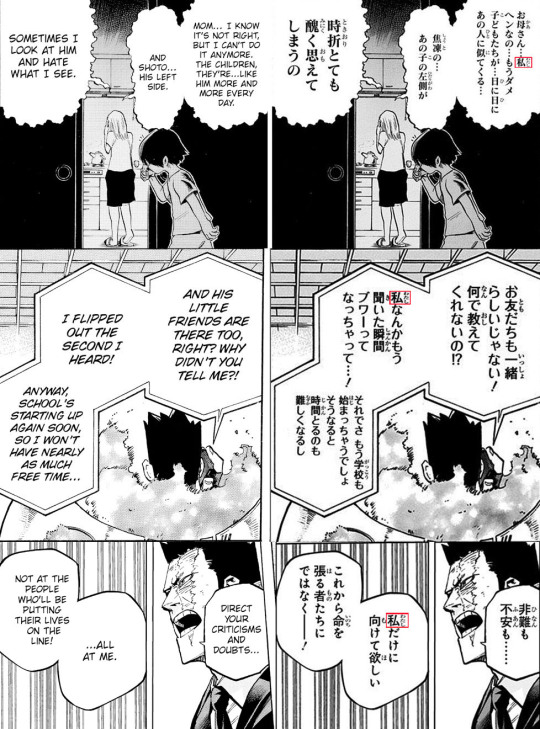
Boku (僕/ぼく Lit. “Servant”)
Used by males of all ages and very often used by boys (for example Midoriya uses ‘boku’ hence the title ‘Boku no Hero Academia’… but All for One also uses it so it’s not just for boys), ‘boku’ is perceived as humble and therefore polite, but can also carry an undertone of feeling young when used by males of older age. In addition to this it’s also used when casually giving deference.
Why I included ‘boku’ in this list if I said all the Todoroki males use ‘ore’?
Well, we actually have some exceptions in which they used ‘boku’.
Differently from Tōya who used ‘ore’ from a very young age, Shōto as a child of 5, used ‘boku’, likely not having the wish to emulate his father’s speech pattern. Interesting enough we know however that Tōya, as an adult, used ‘boku’ when he made his whole speech to the nation which was transmitted during the final stage of the Paranormal Liberation War Arc as, during it, he changed his normally rude speech pattern for one much more polite and humble.
Lastly, although not really a Todoroki but still related to them in a fashion (he’s probably a cousin from Rei’s side since he’s also an Himura), Geten regularly uses ‘boku’.
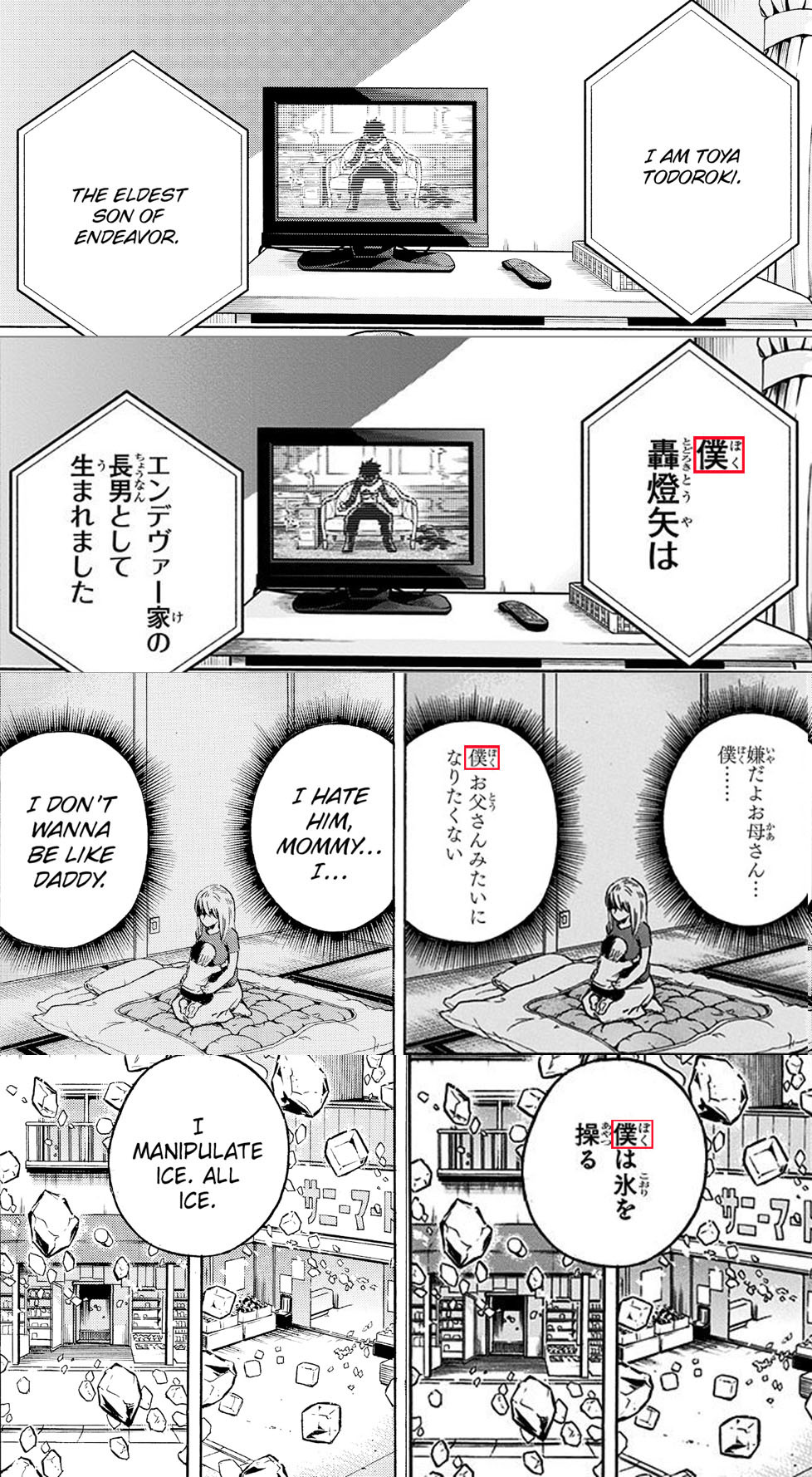
Their own name
Normally used by small children it’s however also a very feminine and kind of childish way to refer to oneself.
Fuyumi, before Natsuo’s birth therefore when she was 3 or younger, used not ‘watashi’ but ‘Fuyumi’ to refer to herself.
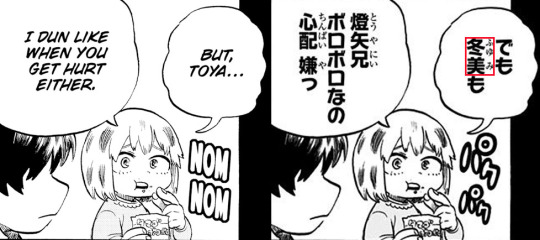
Kono (この “This”) + their own name or personal pronoun
In chap 55 when Enji tells to Gran Torino he will be enough to beat the Nōmu, Enji uses ‘kono Endeavor’ (このエンデヴァー “This Endeavor”). In English this comes out odd and, considering what was said before, you might think it’s either childish or girlish but in this case, with the addition of ‘kono’ the sentence actually remarks the name in a “no one else but Endeavor can do it” way. In the same way in chap 154, when Enji uses this time ‘kono ore’ to tell Hawks if he really believed he was in troubles, it remarks ‘me’ although this time is in the opposite way as to imply “everyone else but him would be in troubles”.
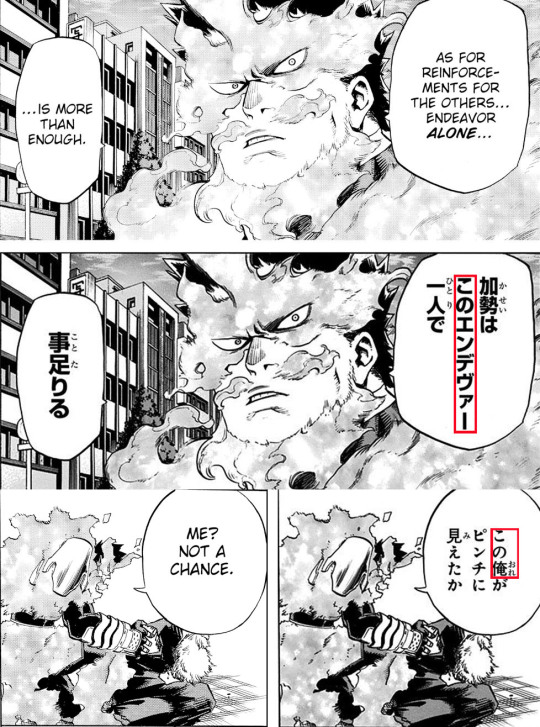
FATHER (父) AND MOTHER (母)
There are various ways in Japanese to say “father” and “mother” that vary for levels of politeness.
Okā-san (お母さん/おかあさん “Mother”)
The addition of the initial ‘o’ (お) and the ‘–san’ (さん) at the end tell us this is a polite way to refer to her, although, since it’s the most common way to call your mother in Japan, even though technically it’s closer to “mother”, it’s perfectly fine to translate it as “mom”, which is currently the most common way to call your mother in English. Note that ‘okā-san’ can also be used to talk about someone else’s mother or for your mother-in-law. Rei is referred as such by all her children, regardless of their age, and even calls herself as such when talking with a young Tōya. Plus this is also how she calls her mother. In the English manga occasionally you also see her called as “mommy” but in Japanese she’s always called ‘okā-san’ only and not in a less formal way (kā-san, okā-chan, kā-chan, mama) and the choice to occasionally translate ‘okā-san’ as “mommy” is likely because the translator felt it would be more fitting for a young child to use it.

Kā-san (お母さん/おかあさん “Mother”)
Same as before but the lack of the initial ‘o’ makes it slightly less polite/formal. It's how Enji calls Rei when talking with Fuyumi.
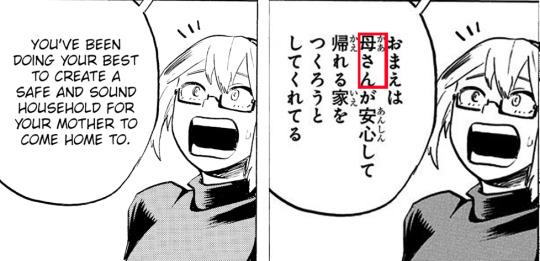
Otō-san (お父さん/おとうさん “Father”)
This is the equivalent to ‘okā-san’ for fathers … but it’s not equally popular as ‘okā-san’ in the Todoroki house. Like ‘okā-san’, 'otō-san' would be closer to "father" but it's okay to translate it "dad" and the English translator occasionally decided to translate it as "daddy" when it was a small child using it. Notably, of all of Enji’s children, only Tōya and Fuyumi still use it, while Shōto, as a child of 5, used it but now doesn’t anymore. Also Rei called Enji as such when talking with a young Tōya.
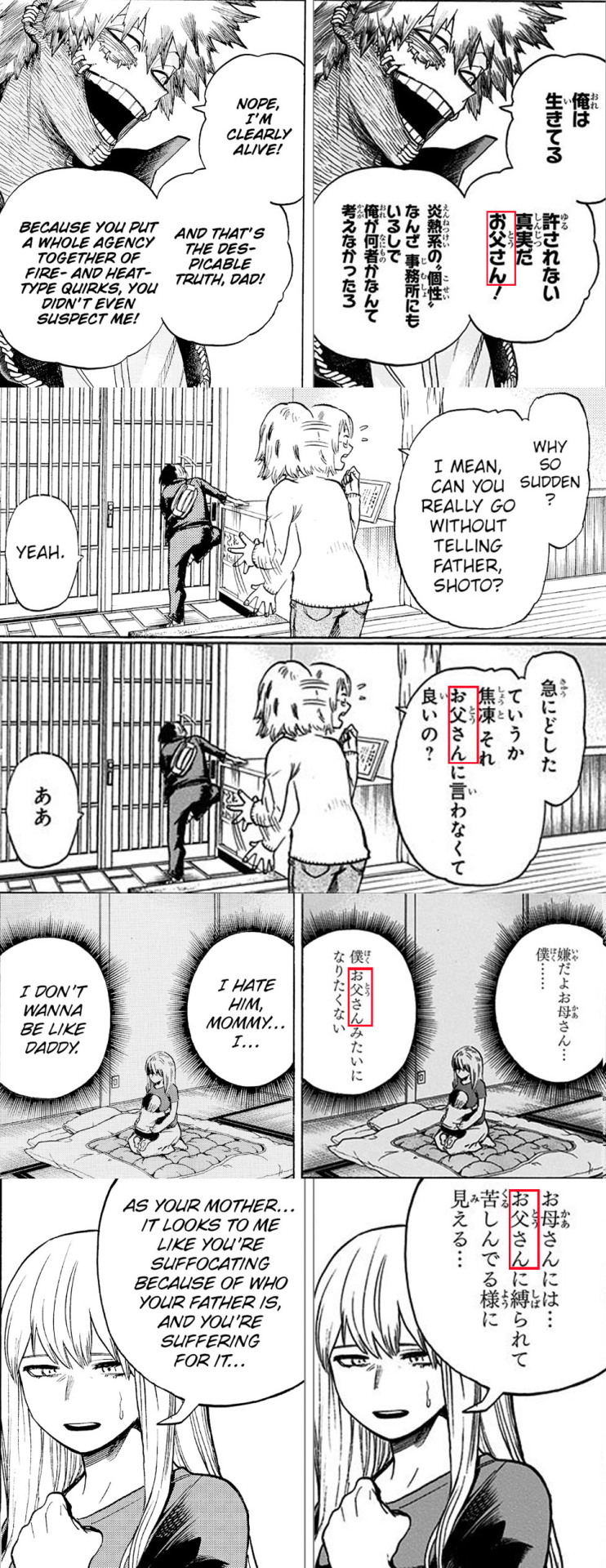
Oyaji (親父/おやじ “Father” or “Old man” lit. “parent father”)
This is a rather nuanced word. Let’s say it’s a more colloquial-sounding way to say “father” which can also used to refer to middle-aged or elderly men. It’s not exactly rude (though some Japanese people consider it as such) but it’s definitely very informal, similar to saying “my old man” in English but (often) without an affection. Again, it's nuanced and depends on the contest. Within one’s own family, teenage and older children, especially males, tend to start using the term to address their fathers at home. In public though, older children will typically call their own fathers ‘otō-san’. Using such word in many cases gives a ‘rough guy’ vibe. Teenager Shōto uses it to talk with or about Enji, regardless he's at home or not, and he’s clearly doing it because he refuse to show him respect, opposite to how he still call Rei ‘Okā-san’ instead than the ‘oyaji’ equivalent, ‘ofukuro’ (お袋). This contrasts sharply with Tōya, who instead regularly uses ‘otō-san’ (though if he does so in a mocking way or as a call back to the past since the past never dies it’s up to speculation) and uses ‘oyaji’ only in a couple of circumstances (chap 301 and 390). In chap 301 he’s clearly trying to keep distance from him as he speaks to himself since he calls him ‘oyaji’ and ‘Todoroki Enji’ instead than his usual ‘otō-san’. In chap 390 he’s being deliberately as rude as possible as he tells him to die. More about it later. It's possible Natsuo would also use 'oyaji' to call Enji, though so far we only saw him either calling him by his Hero name or using 'anta' (あんた) to call him. More about it later.

BIG BROTHER (兄) AND BIG SISTER (姉)
Same as with “father” and “mother” there are various ways in Japanese to say “big brother” and “big sister” that vary for levels of politeness. Note that in theory in a Japanese family the children aren’t all equal but older siblings are hierarchically higher than younger siblings and younger siblings own them respect.
Nē-chan (姉ちゃん)/Nē-san (姉さん)/Onē-chan (お姉ちゃん)
‘Nē’ (姉) is the word used for “big sister”. It can be used alone or after the name of the person in question and the level of politeness changes according to the suffixes and prefixes used. ‘O’ (お “honorable”) gives an extra layer of politeness, '-san' (さん) is your standard polite suffix (when added to a name is generally translated as “Mr.”, “Mrs.”) while –chan (ちゃん) is generally affectionate and expresses closeness and endearment.
Natsuo calls Fuyumi ‘nē-chan’, which is clearly familiar and affectionate, but Shōto calls her ‘nē-san’, therefore sounding more polite and distant. This can reflect the fact that Natsuo grew up closer to Fuyumi and is also closer in age compared to Shōto but might also be a reflection of how they were raised. When Rei told Natsuo to protect his big sister in chap 388, she told him to protect his ‘onē-chan’ (the ‘o’ adds a tone of politeness, but likely Rei always uses it as a way for Rei to remind Natsuo to be polite with his older sister), therefore she might have encouraged him to use a more endearing and close term for his sister, something she might not have done with Shōto merely because he wasn’t allowed to interact with Fuyumi (and the rest of his siblings) when Rei was living with them. In chap 192 Fuyumi calls herself his ‘nē-san’ when talking with Shōto, likely because after Rei left she took up a mother role to him and Shōto might have ended up calling her as such in response. Enji also, when talking with Natsuo, used ‘nē-san’ to talk about Fuyumi and he might have done the same with Shōto so that he ended up doing the same.

Nī (兄)/Nī-chan (兄ちゃん)/Nī-san (兄さん)/Aniki (兄貴)
‘Nī’ (兄) is the word used for “big brother”. The level of politeness changes according to the suffixes and prefixes used, same as ‘Nē’. Now… Tōya is called just ‘Tōya Nī’ by all his siblings and Shōto calls Natsuo ‘Natsu Nī’ as well, no suffixes or prefixes attached. Using just ‘Nī’ it’s very informal and childish but it started likely due to Fuyumi and Tōya being very close in age (11 months of difference) and therefore being allowed to a lower level of formality. Since Shōto was kept apart from his siblings and this lead Rei to stay away from her other children to take care of him as well, Natsuo likely copied Fuyumi’s way to call Tōya and, eventually, Shōto ended up doing the same with both his older brothers despite not being close to them, probably merely because he mimicked the way they talked. Note that when talking to Shōto in chap 34, Enji referred to Tōya as his big brother, he called Tōya his ‘nī-san’. Tōya instead referred to himself as his ‘nī-chan’ twice when talking with Shōto, which could have been mocking but could have also been the way he used to refer to himself with his siblings as a kid. In chap 388 and in chap 244/350 Natsuo and Shōto, when arguing with Tōya drops the childish and familiar ‘nī’, which would be unfitting of the situation, and switch to ‘aniki’ (兄貴). ‘Aniki’ is still a way you can use to call your older brother (‘ani’ is another way to read the kanji for “big brother” (兄) and '-ki' (貴), when added after nouns related to people expresses love and respect) but it’s considered less formal than ‘onī-san’/‘nī-san’, yet not endearing or childish like ‘nī’/‘nī-chan’/‘onī-chan’ as it has a rough note (kind of like ‘oyaji’). It’s notable they don’t use just ‘aniki’ but add a pejorative. Natsuo goes for a ‘KUSO aniki’ (クソ兄貴 “shitty/damn big brother”) while Shōto, who is less close to his big brother, goes for a tamer ‘baka aniki’ (馬鹿兄貴 “stupid older brother”). More about this though, later on.

YOUNGER BROTHERS AND YOUNGER SISTERS
Normally they’re referred just by name, however in Fuyumi and Natsuo’s case they actually have the equivalent of ‘pet names’ of some sort.
Tōya calls Fuyumi ‘Fuyumi-chan’ (冬美ちゃん) and Natsuo ‘Natsu-kun’ (夏くん). As said before ‘-chan’ is generally affectionate and expresses closeness and endearment and, in case it’s attached to the name, is used from older person to younger person. You might want to translate it something like “little Fuyumi” or “dear Fuyumi”. As for Natsuo… ‘-kun’ (君/くん) is usually used for addressing males younger than the speaker. Boys in the same age group can call each other with ‘-kun’ (Midoriya, for example, adds ‘–kun’ to the surname of all his male classmates… while Shōto instead calls them simply by surname). Sometimes male office workers call their younger female colleagues with it. This is not rude but a sign of familiarity. You might want to translate it something like “young Natsu” but just "Natsu" would be fine as well. Interesting enough while Fuyumi calls Natsuo just ‘Natsu’, Rei also calls him ‘Natsu-kun’, Natsuo being the only one among her kids she doesn’t call just with his full name. Shōto is the only one of the younger Todoroki kids who didn't have a suffix attached when called by his older siblings. As said before, being called something different by just your name is not mandatory but it's possible in Shōto's case this is not happening due to him being kept away from them or due to Tōya having been the one who decided the 'pet names' for his younger siblings.
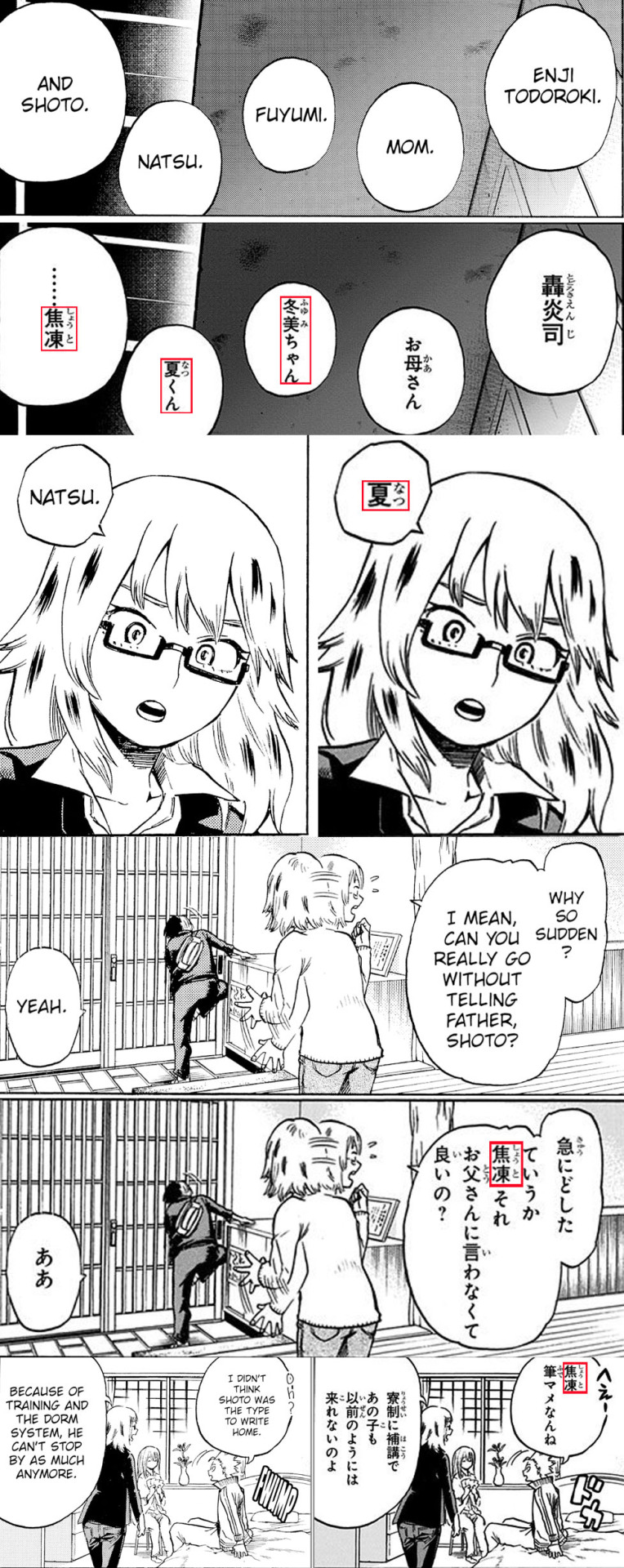
HUSBAND AND WIFE
Again, there are various ways for a husband to call his wife and vice versa.
In Enji’s case though he commonly refers to/calls his wife as just ‘Rei’ and calls her ‘tsuma’ (妻 “wife”) only once, when talking about her and his children in chap 248.
Another common Japanese way to refer to your husband/wife is by calling them "you" (the wife would use ‘anata’ (あなた), the husband would use 'omae' (おまえ)). This often gets translated as "dear" in English manga.
In Rei’s case she usually calls Enji ‘anata’ (あなた), although, for obvious reasons, in the English manga in this case it doesn't get translated as "dear". In Enji's case he occasionally uses 'omae' for her, but since 'Rei' is his default way to call her and 'omae' is his default "you" pronoun for all his family, very likely his 'omae' with her isn't more meaningful than an ordinary "you". More about "you" later on.
Interesting enough in some houses once children are born, the parents start calling each other ‘Otō-san’ and ‘Okā-san’ and when talking with a young Tōya about Enji, Rei called Enji ‘Otō-san’ while Enji, when talking with Fuyumi, calls Rei ‘Kā-san’ but here it was likely done because they were talking with their children about the other parent and not because they are used to call each other in such way.
Interesting enough Nao didn’t use ‘anata’ for her husband but ‘Kotarō-san’.

THE CHILDREN
Enji refers to all his children by first name, while Rei does the same for all her children except Natsuo whom she calls ‘Natsu-kun’.

Both parents, when wanting to talk about their children without saying their name call them either ‘ko’ (子) or ‘kodomo’ (子ども). Both mean child (and can be pluralized) but 'ko’ (子) is a more general term for a child, which is often used in a neutral or formal context (even when the child is actually an adult) while ‘kodomo’ (子ども) is a more specific and inclusive term commonly used to refer to children in a more affectionate or informal way or to emphasize the innocence and vulnerability of children, often used in educational or parenting contexts (and, in the manga, generally used to refer to the Todoroki kids when they were… well, kids). I know I said I wouldn't mention nouns that are too general but, in this case, I’m mentioning all this because, although Enji has no problems in referring to his children as 'ko’ (子) in chap 31, while talking with All Might, Enji referred to Shōto as ‘ko’ (仔) which sounds the same as “child” (子 'ko’) but the kanji he uses is not the usual one for “child” (子) but this one (仔) which means “offspring” and, normally, is used for “young animals/cubs” or “young plants/seedlings”. It’s possible Enji is using it because, when he does, Horikoshi wants us to get the idea Enji is basically talking of how Shōto was breed and raised for the purpose of defeating All Might, as if he were some sort of racehorse, the full sentence being the following:
‘Kore dake oboe toke. ARE ha… izure kisama wo mo koeru HERO ni suru. Sō surubeku… tsukutta ko da’
「これだけ覚えとけ。アレは…いずれ貴様をも越えるヒーローにする。そうするべく………つくった仔だ」
“Just remember this. That one we’re talking about… I’ll make him a hero that will surpass you someday. In order to do that… I had/trained/created that child.”
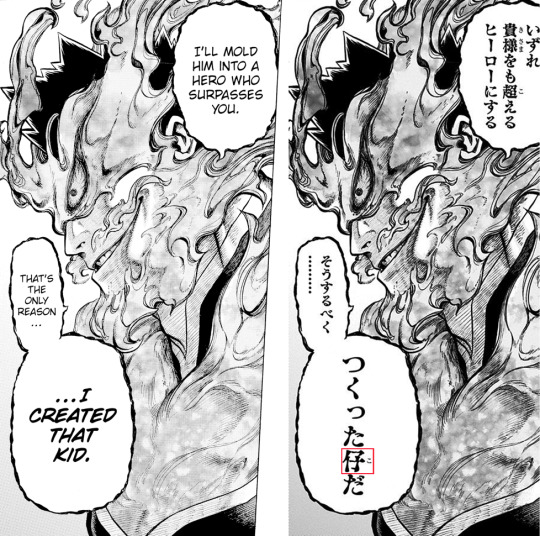
THE GRANPARENTS
In chap 31, when talking about his grandparents Shōto called them ‘haha no shinzoku’ (母の親族 “mother’s relatives”).
'Haha' is the word you use with people outside your group to talk about your mother.
'Shinzoku' (親族) is, under Japanese law, a term that refers to people who we are related to by blood or marriage (you can translate it also as "clan") so yes, it might not necessarily means Rei's parents. It's worth to remember the Himura were an important family with a family head who might not have necessarily be Rei's father (it could have been her grandfather or even her father's male heir), though, due to Geten's story and the scene we saw in chap 301 that in the Himura family the "family head" (当主 ‘tōshu’) was Rei's father.
By the way, the Todorokis instead mention often the 'kazoku' (家族 "family") which is the family unit formed by a married couple and their children.
Shōto might refer in such a formal way to his grandparents either because he's not close to them or because he's talking with Midoriya.
In chap 302 when he refers to his grandparents Tōya called them ‘Obā-chan-tachi’ (おばあちゃん達 “grandma and the others”).
The ‘o’ (お “honorable”) in 'obā-chan' gives an extra layer of politeness while '–chan' (ちゃん) is generally affectionate and expresses closeness and endearment. By using '-chan' and singling out his grandmother (who unlikely was the family head) instead than his grandfather Tōya sounds close to her.
It's possible though his grandfather died when he was younger, hence he referred to his grandmother.
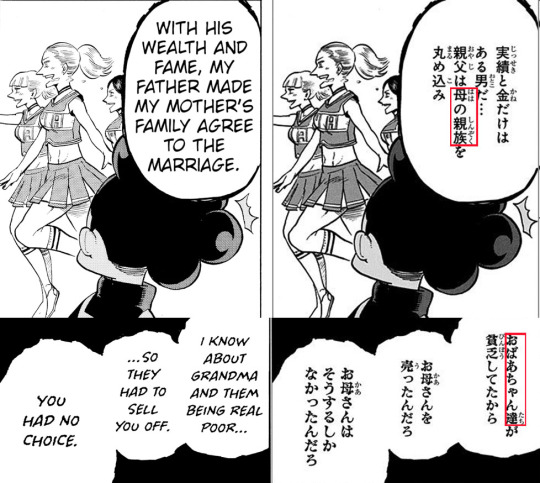
For more about the Himura you might want to read my post about the Himura family.
WHO WORKS FOR THE TODOROKIS
In chap 302 Enji says he’ll hire more ‘shiyōnin’ (使用人 “servant/employee”).
In chap 249 Natsuo calls the person who used to cook for them ‘otetsuta’ (お手伝 “helper/maid”).
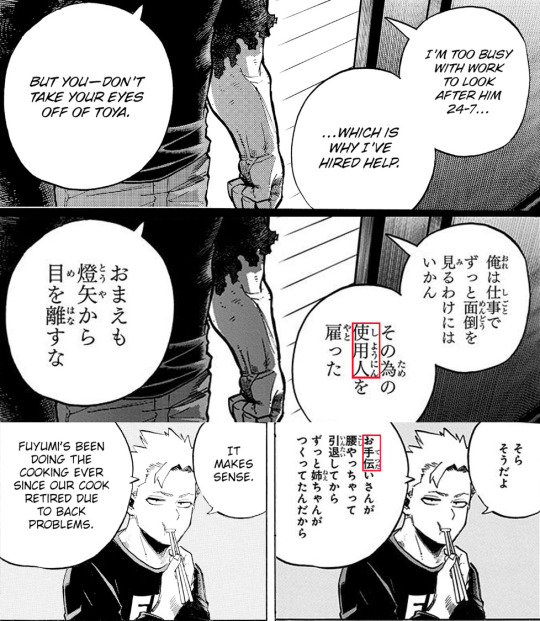
Enji, in his role as Hero, has also an 'untenshu' (運転手 "driver"), Kurumada Untenmaru, but we don't know how Enji or the other Todorokis call him, just that Kurumada calls Enji 'Endeavor' (and 'No.1' in the OAV) and uses 'anta' (あんた) with him (more about 'anta' later on), while he calls 'jarinko' (ジャリンコ) Shōto, Midoriya and Bakugō.
'Jarinko' (ジャリンコ/じゃりんこ/じゃりん子/砂利子) is an old fashioned word used to call a "student who can't keep up in school" but it's also used to say just "brat".

In theory, more than to the Todoroki family, Kurumada is connected to the Hero world, but since, according to his profile, he knows Enji by a looong time (and is one year older than him) I thought to include him as well.
HEROES AND VILLAINS
In Enji, Tōya and Shōto’s case, in addition to their own name they also have their Hero/Villain monikers, 'Endeavor' (エンデヴァー), 'Dabi' (荼毘 "cremation") and 'Shōto' (ショート yes, same as his name but written in katakana instead than kanji)… plus Enji also is defined by his ranking (‘No.2’ first, ‘No.1’ after). In some circumstances the family uses such names instead than the usual way they call them.
Interesting enough though, when Shōto interns under Enji, Enji calls him with his Hero name (which is still 'Shōto' but written in katakana so you can’t really notice it in the anime but it’s visible in the manga) and of course he called Tōya 'Dabi' until he discovered he was his son. After that moment he always called him just Tōya and I couldn’t find an instance in which he called him ‘Dabi’ again.
In fact, even after waking up in the hospital, Enji wants to say Endeavor is dead since he can’t kill a ‘Tairyō satsujin-sha’ (大量殺人者 “mass murderer”) (aka Tōya) but what he voices is instead he can’t kill his ‘musuko’ (むすこ) which means “son” (息子) and, when he finally fights Tōya, he ends up seeing him as the kid he was... making him unable to make a distinction between Tōya and Dabi. Once he acknowledges that Dabi IS indeed Tōya, he won't be able to go back see him as Dabi or call him as such, differently from others of his family members.
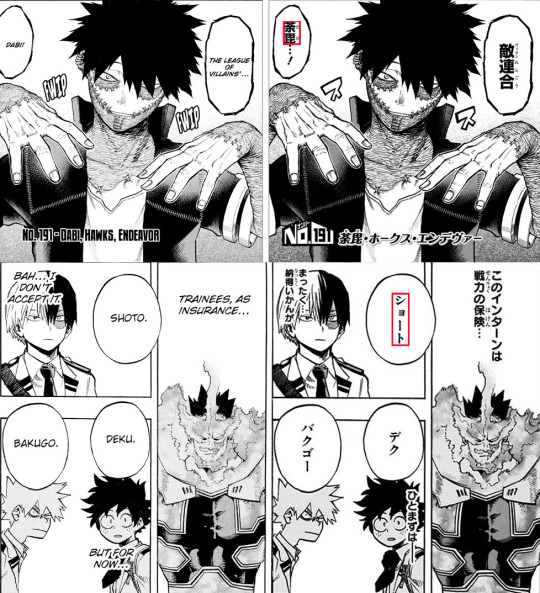
We never see Rei calling Enji 'Endeavor' but we see her calling Tōya 'Dabi' once, when she tells her husband he must fight him (during the rest of the discussion she called him 'Tōya' or 'ano ko' (あの子 “that child”))... as calling him 'Dabi' probably helps her to distance herself from how she's asking Enji to fight their son (Chap 302).

Natsuo called his father 'Endeavor' in chap 249, during the dinner at which Midoriya and Bakugō were invited. This seems to remark his wish not to acknowledge Enji as his father but as a stranger.
Natsuo also refers to his brother as 'Dabi' in chap 302, but more as something that was created more than as his brother, as he's also likely trying to distance himself from the idea Tōya and Dabi are one and the same.
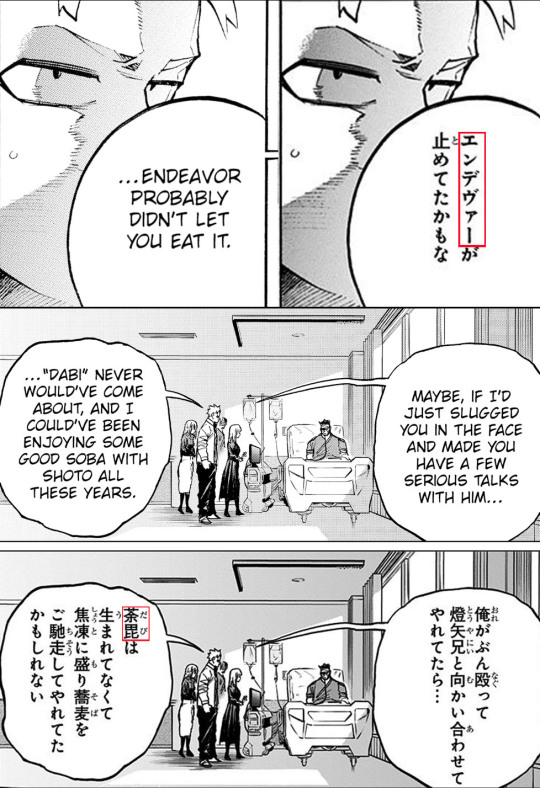
At the same time Shōto called his father 'Endeavor' during the Stain case when asking to other Heroes about him (chap 55) and during his internship (chap 249), in short when he needed to acknowledge him as a Hero.
As for Tōya, of course Shōto called him 'Dabi' before the reveal. After the reveal, in chap 349 Shōto, before fighting Tōya, starts calling his brother just ‘Tōya’ (without the ‘nī’ (兄) which is kind of rude) then decides to switch to ‘Dabi’, either to acknowledge him as a Villain or to keep emotional distance from him. We know also that in the flashback in chap 352 called 'Dabi' his family's sin.

Tōya isn’t really prone to call Enji 'Endeavor' and does so only in few notable situations:
- prior to becoming Dabi, solely when telling Enji to look at him before attacking Shōto as a child (chap 301);
- when facing Enji as Dabi after Enji’s fight with the Nōmu (chap 190);
- when denouncing Enji on tv (Chap 290);
- during the Paranormal Liberation War when he attacked him (chap 292)... although during the battle he alternated calling him 'Endeavor' and 'otō-san';
- when he repeated what Skeptic told him, that Endeavor was at Gunga... but what's meaningful here is that the reading for 'Endeavor' is given as 'otō-san' (chap 374).
This seems to imply Tōya uses 'Endeavor' solely when he's talking to/about/him in his role as a Hero.
On the other side Tōya never calls Shōto with his Hero name… even though, of course, since it matches with his normal name, no one can realize it.
Now... I said the family tries to distance the idea that Tōya IS Dabi by calling him Dabi... but credits when it's due, Tōya himself said that Tōya died and Dabi was born so he too is keeping the two identities parted in a way... albeith he has no problems to refer himself as 'Tōya' and be called as such, both by his family and by Himeko, who switches on calling him from 'Dabi-kun' to 'Tōya-kun', so more than identities, we should probably say he means the person he once was 'died', as he started aiming for different things and behaving differently.

Not quite Todorokis but still related to them, in chap 301 the Himura family head who’s likely Rei’s father, called Enji ‘Endeavor-sama’ (エンデヴァー様) and ‘Top Hero-Sama’ (トップヒーロー様) instead than using his civilian name.
'-sama' (様/さま) is much more formal and polite than just '-san', to the point it’s sometimes translated as “lord”/”lady”.
The fact that the Himura family head is using it underlines how high he thinks of Endeavor, for being such an important Hero.
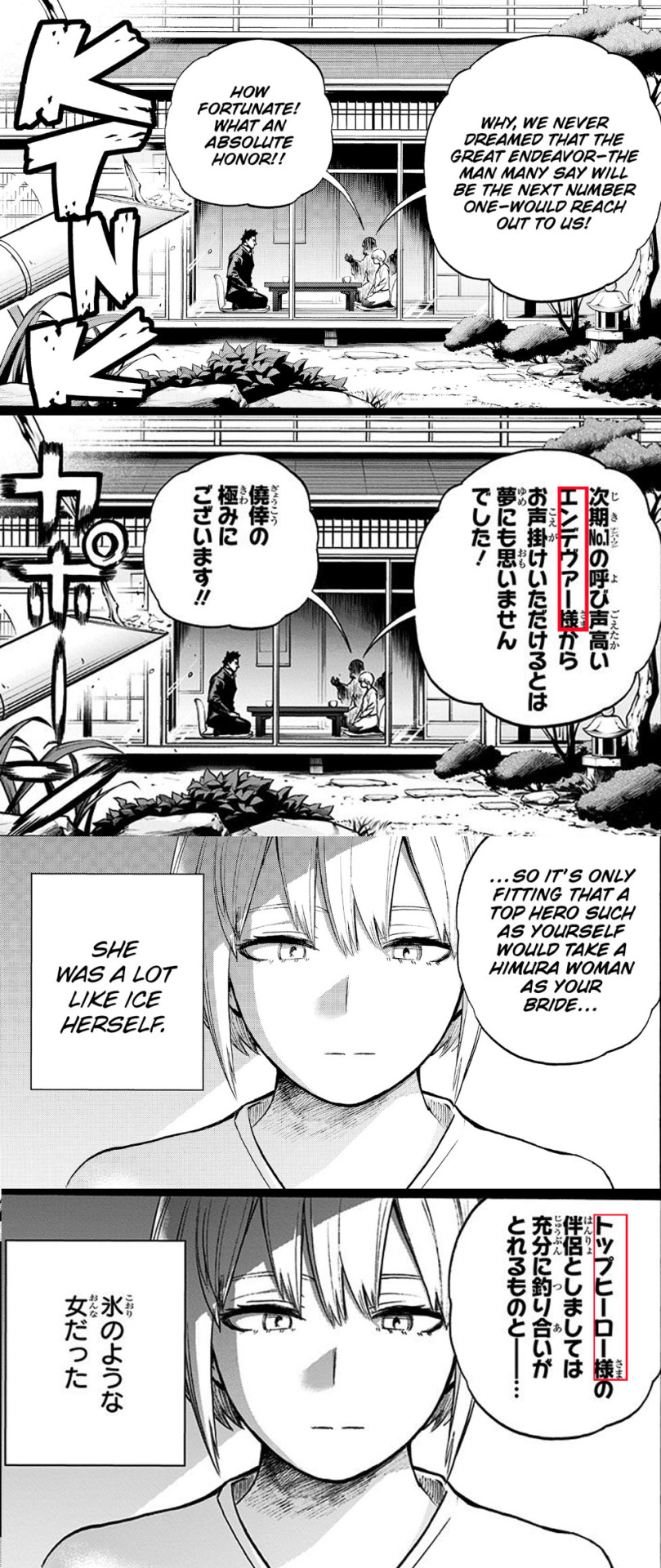
Enji also gets called 'No.2' and then 'No. 1' after he rises to the position. Shōto in chap 31, calls him 'mannen No. 2 no HERO' (万年No.2のヒーロー "eternal No. 2 Hero"). Then after he becomes No.1 Natsuo refers to him as such in chap 192, Shōto does so in chap 247, and Tōya does so in chap 191 and 231. In chap 191 Tōya also called him ‘No. 1 hero-san’ (No.1ヒーローさん), when telling him goodbye and that they’ll have a chance to talk again... though the politeness here is probably an attempt at sarcasm.
In chap 290 Enji himself defined himself ‘kono kuni no Top Hero’ (この国のトップヒーロー “this country Top Hero”).
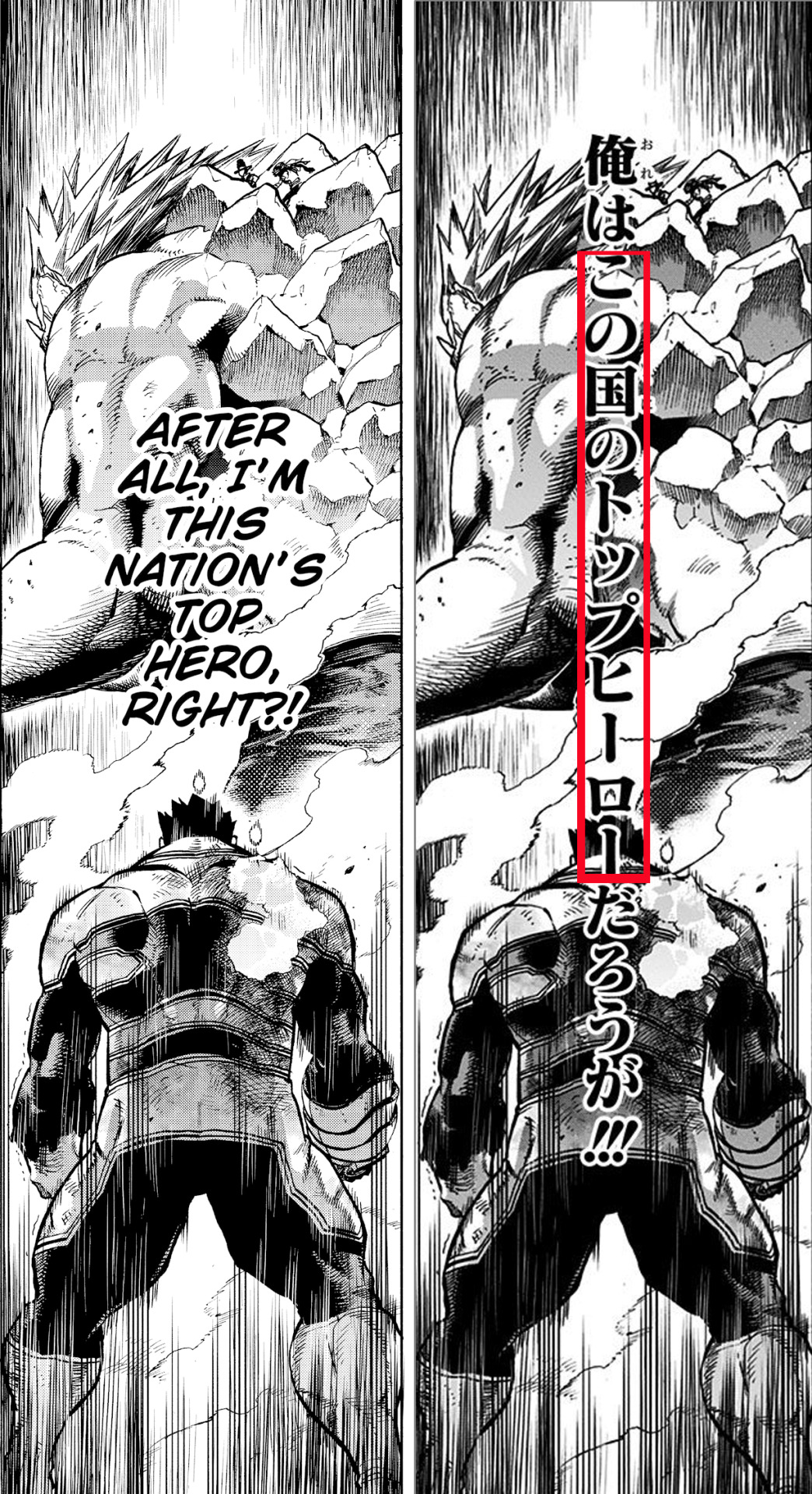
Also I’m placing it here, though I doubt Rei is referring to his Hero role but to how Shōto managed to positively react to all he went through (differently from the rest of the family so he's kind of like a role model to them)… still in chap 302 Rei says Shōto is the ‘Todoroki-ke no HERO’ (轟家のヒーロー “Todoroki’s family Hero”) but the reading given is ‘Uchi no HERO’ (ウチ のヒーロー “our own family’s hero”).
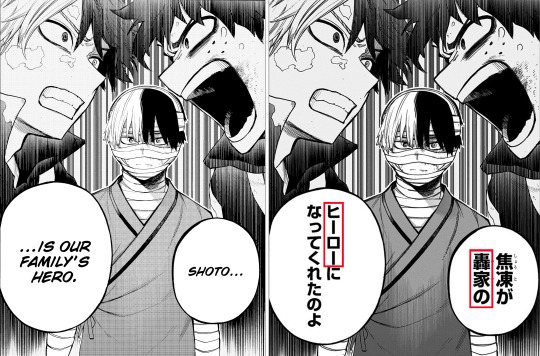
YOU
Polite Japanese speech requires not the use of “you” but the use of a person’s name. However the Todorokis are a family, they talk to each other in an informal way and so they do use also “you” to talk with each other.
Anata (あなた,貴方, 貴男, 貴女 Lit. “precious toward”)
This is the only second person pronoun comparable to English “you”, yet still not used as often in this universal way by native speakers, as it can be considered having a condescending undertone, especially towards superiors. For expressing “you” in formal contexts, using the person’s name with an honorific is more typical (Hawks tends to use 'Endeavor-san' when talking with Enji and switches to 'anata' only when he doesn't want to repeat 'Endeavor-san'). More commonly, ‘anata’ may be used when having no information about the addressed person; also often used as “you” in commercials, when not referring to a particular person. Furthermore, commonly used by women to address their husband or lover, in a way roughly equivalent to the English “dear”. Rei uses always ‘anata’ to talk with Enji but, of course, due to their (poor) relation, we never see it as being translated as “dear” in the English manga.
Omae (おまえ/お前/御前 Lit. “polite front”)
This is the “you” everyone in the Todoroki family uses. Of course it comes with a nuance. If used to talk with people outside the family it’s used by men with more frequency and expresses the speaker’s higher status or age, or a very casual relationship among peers. Often used with ‘ore’ it can be very rude if said to elders. Commonly used by men to address their wife or lover, paralleling the female use of ‘anata’. Of course, since the Todorokis are a family, they use it with each other and it’s not meant to be rude (and yes, occasionally Enji used it with Rei though it’s not as recurring as she uses ‘anata’ so it might not have the same nuance)… and since the male Todorokis are rough, tough males who use ‘ore’ they also use it with people that’s outside the family but in this case it’s actually kind of rude (notable how Geten for example uses it with Dabi during their fight).
Anta (あんた/アンタ)
Contraction of ‘anata’ is also generally not used as it’s considered too direct. Can express contempt, anger or familiarity towards a person. Sometimes it can be felt as more rude than ‘omae’ sometimes it’s the opposite. Generally seen as rude or uneducated when used in formal contexts. ‘Anta’ is often used among girls who want to act leading the guy a little bit forcely and scoldishly. There are a bunch of time in which ‘anta’ is used among the Todoroki family members and they’re all when a character is scolding another. We start with Fuyumi who, when scolding Natsuo in chap 187, calls him ‘anta’ (あんた), we continue with Natsuo who, when arguing/scolding Enji in chap 192 and 302 calls him ‘anta’ (あんた) and we finish with Shōto who, when arguing with Enji in chap 351 about who of them has to face Tōya calls him ‘anta’ (アンタ) to tell him he’s the only one who can face All for One. Yes, Shōto uses katakana which generally are used to underline the word, so it's possible it's done to remark how only Enji can do it but also to underline how Shōto, who's angry, is not using his usual ‘TemeE’ (てめエ) with his father but a tamer word. Interesting enough Tōya, or probably I should say in this case Dabi, uses ‘anta’ too, but not with his family member but with Ujiko in chap 350 both to refer just to him and to him and All for One ‘anta-ra’ (あんたら “you” (plural)). Dabi is an ‘omae’ guy who’s generally not polite but calls Ujiko ‘Ujiko-san’, so the fact for him he uses ‘anta’ and not ‘omae’ is probably meant to feel less rude that if he were to use ‘omae’. Another character connected to the Todoroki family who uses ‘anta’ is, as I've already said, Kurumada with Endeavor.
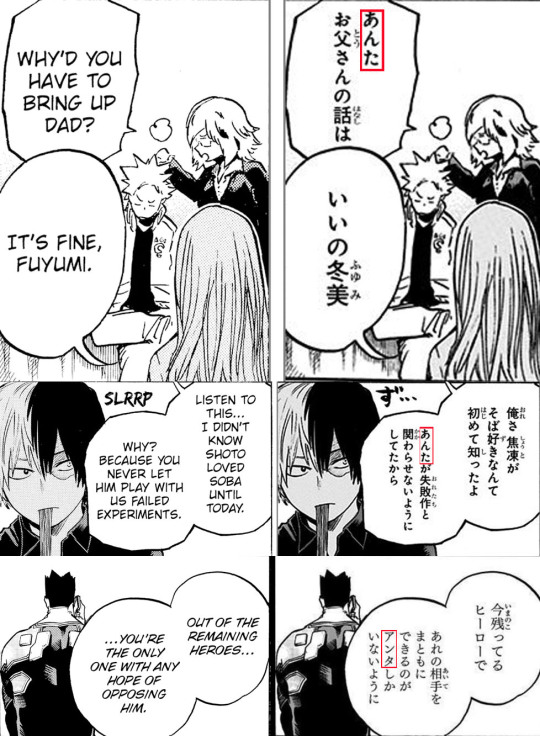
Temē/TemeE (てめえ/てめエ/手前 Lit. “the one in front of my hand”)
'Temē', a reduction of 'temae', is, according to some, the rudest way to say “you” even more rude than ‘Kisama’ (we’ll talk about it in a while) and it’s used when the speaker is very angry. It’s the sort of thing you might translate with “son of a b*tch” or some other insult along the line. Originally used for a humble first person, it’s an ateji, which means either the readings of the individual kanji do not match the reading of the word, or the meanings of the individual kanji do not match the meaning of the word. Shōto uses ‘temeE’ (てめエ) in chap 34 when arguing with Enji (which makes notable how he’ll only use ‘anta’ much later on when arguing with him in chap 351) and again uses ‘temeE’ (てめエ) in chap 292 when fighting with Tōya and Tōya also uses ‘temeE’ (てめエ) in chap 351 when fighting with Shōto (in their previous fight he used ‘omae’ with him). The fact that the last ‘e’ is written in katakana instead than hiragana is often done to put emphasis on it.
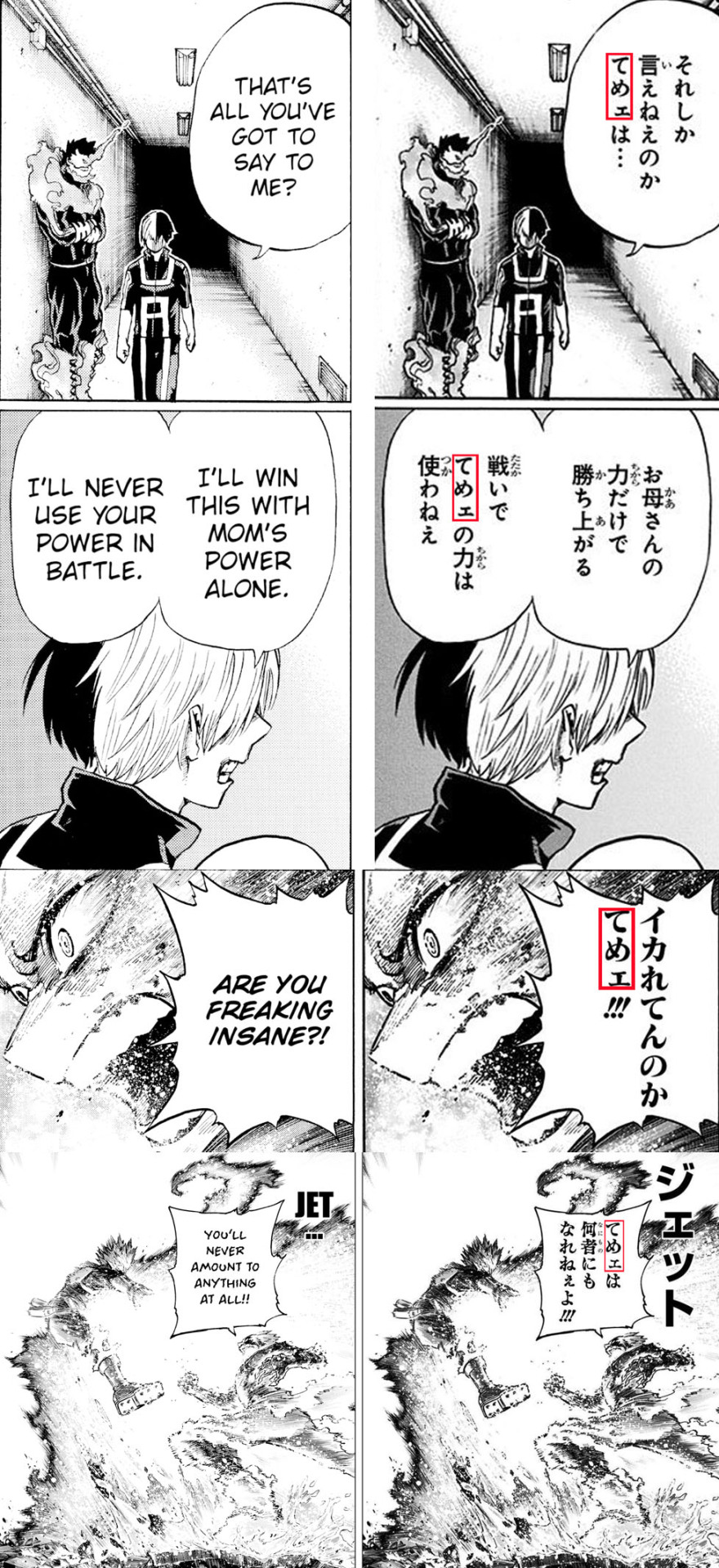
For completeness sake I’ll report two other ways to say ‘you’ which some of the Todorokis use but not, as far as we know, with their family members.
Kimi (君/きみ Lit. “lord” (archaic))
It’s the kanji also used to write '-kun'. Informal to subordinates; can also be affectionate; formerly very polite. Among peers typically used with ‘boku’ (僕) (so, as you can easily guess it’s Midoriya’s “you” when he’s not using someone’s name). Often seen as rude or assuming when used with superiors, elders or strangers. Enji uses it when talking with Midoriya at the sport festival and when he observes how Midoriya too was one of them because he should have suffered for his Quirk, showing him some degree of politeness… but he will eventually switch on using ‘omae’ for him during the Dark Hero arc, which likely his meant to imply they gotten more familiar, not that he's being disrespectful.
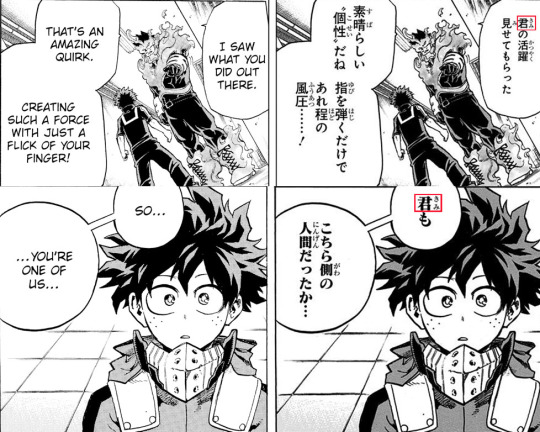
Kisama (貴様/きさま Lit. "precious lord")
Historically very formal, but has developed in an ironic sense to show the speaker’s extreme hostility/outrage towards the addressee. It’s basically so rude/aggressive it often gets translated into “bastard/you bastard”. Enji uses it when talking with All Might, sometimes outright saying ‘kisama’, sometimes the furigana say ‘All Might’ but the kanji below say ‘kisama’ just to drive home the way Enji is saying ‘All Might’ is all but polite and all this is very rude as All Might isn’t just ranked above him but he’s older than him and a Hero by longer time so he definitely deserves more respect. Enji also calls ‘kisama-ra’ (it’s a plural form of ‘kisama’) Midoriya and Bakugō when they intern under him. This is actually interesting. He starts with ‘omae-tachi’ (it’s a plural form of ‘omae’) when he says he’ll supervise them, then switches to ‘kisama-ra’ when he tells Bakugō and Midoriya to tell him about themselves, then he moves to ‘kimi’ when he says since Midoriya too suffered for his Quirk he’s one of them… to go back to ‘kisama’ when he address Bakugō only… to switch again to ‘omae-tachi’ when he’s addressing the three of them… to go back to ‘kisama-ra’ when he tells them they’ve to gain experience working under him and uses ‘kisama-ra’ again when he tells Bakugō and Shōto he’ll give them the same assignment and also uses it to tell the three of them won’t impact on his work. Long story short, very likely that ‘kisama’ is solely meant to remark how they’re working under him. He also uses ‘kisama’ when he begins interacting with Hawks (who instead, as said before, uses 'Endeavor–san' and when he has to use “you” with him goes for ‘anata’ despite Hawks being an ‘ore’ guy), only to switch to ‘omae’ later on.

CONTINUE IN THE NEXT PART!
35 notes
·
View notes
Text
How the Todorokis call each other (Part 3)
So this is the continuation of Part 1 & Part 2.
Here I focus on stuff I couldn't fit in the previous parts and that often, more than being how the Todorokis call each other are about how they are called by other people or how they call other people.
This part is a much less comprehensive guide as otherwise we would have gone on and on and on endlessly, listing the various interactions the Todorokis has with other characters, so I only picked up th eones I thought were more meaningful.
WE NEED PLURALS!
Plural is often not used in Japanese but it’s not like it doesn’t exist. To make it, the most common way is to add to a noun a plural suffix, which can be translated as something like “X and the others” or “X and the group of which X is a part of” thougn since those are long sentences which don't sound really well in English, more often than not translators prefer to find a plural noun that can replace the whole thing.
-tachi (達/たち) & -ra (等/ち)
'-tachi' (達/たち) is very common, pretty neutral in terms of formality and it’s super flexible to the point you can add it to pronouns, people’s names, and even non-human things that you want to personify.
'-ra' (等/ち) is reasonably neutral and flexible in terms of formality, but it’s more on the casual side compared to ‘-tachi’, so it’s often associated with friendliness and/or disrespect. For this reason, it generally isn’t used for people who are of a higher social status than the speaker. It’s usually written in hiragana and with first-person pronouns, can be used to express the feeling of unity with the people you’re including in “we.”
Those two are the most recurring ways in which the Todoroki pluralize words. Enji waves between the two, in the early parts of the story and when his kids were younger he used '-ra' to talk about them, then he switched on the more polite '-tachi'.
While again, since they're family and his kids (and therefore socially considered below him) using '-ra' is fine, it's interesting how he starts switching to '-tachi' first in an internal monologue, then openly when speaking with them. Since Enji wants to project a certain image of himself it can be that the '-ra' that he used early on was due to this and when he felt more willing to show his apprecciation and respect for his family he switched openly to '-tachi'. Of course it can also just be he uses '-ra' because he's not talking with them but about them, and so he feels it's okay to be less formal. Do your pick.

The rest of the family favour ‘-tachi’, although Natsuo in chap 187 to refer to himself his mother and sister uses '-ra', in this case likely to imply closeness and familiarity more than a lack of respect.
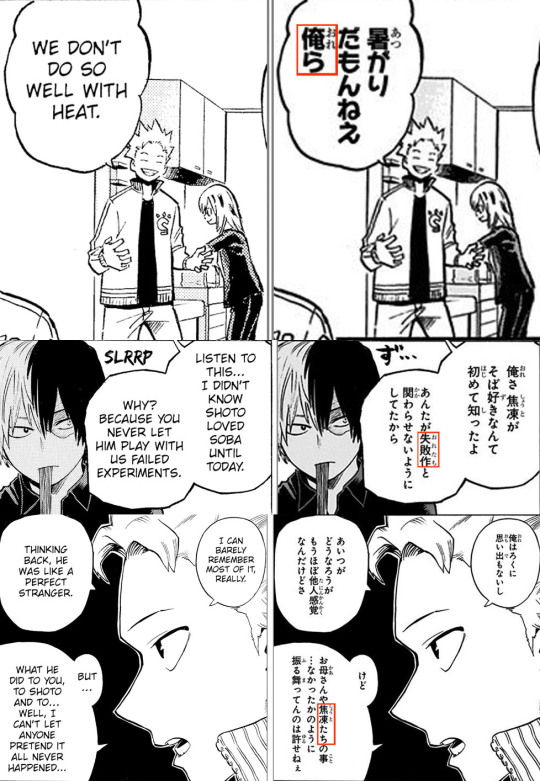
Tōya who also favor ‘-tachi’ when he’s using ‘ore’ or talking about his family members (for his grandparents even uses '-tachi' written in kanji), does some interesting exceptions when he’s not talking about it. For example he tends to refer to the Heroes as ‘omae-ra’ (chap 74-82) clearly wanting to be rude but he also uses it for Ujiko and All for One (and in this case he's probably trying to be less rude than with the Heroes as he uses 'anta-ra').
However, when he uses ‘boku’ in his speech to the nation, he uses ‘boku-ra’ to refer to himself and the league, likely in an effort to sound humble and therefore more polite.
Another notable exception he does is when he talks with Himiko in chap 341. Even though, as said before, he generally uses ‘ore-tachi’ (and does so in that discussion as well) there’s a moment in which he uses ‘ore-ra’ when he says the world can’t catch the two of them, in a way that’s probably meant to imply closeness between him and Himiko as that talk is also the one in which he’ll call her by her full name (which he never did before).

-domo (共)
'-domo' implies speaker is of higher status than those referred to. The Todorokis don’t use it for their family members, I’ve mentioned it merely because Dabi when talking to the Vanguard action squad called them all ‘IKARE yarō-domo’ (イカレ野郎共 “Crazy guys”), reminding them he's the boss and they're hierarchically below him.
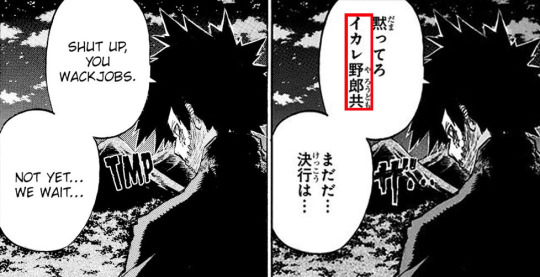
Wareware (我々 “we”)
This is the more formal and common way of saying "we" or "us", in fact it is often used in written Japanese, in formal speeches or in official documents. It is also used in situations where the speaker wants to emphasize the collective identity of the group they are referring to. Enji uses it when he talks of himself and the other Heroes in chap 317.

Kyodai (兄弟 “siblings”)
Literally this words means “big brother younger brother”and a plural for ‘sibling’ and can works to include both males and females siblings… however I’ve been told it implies the siblings in questions have to be older and younger than the person they’re related to. This means it wouldn’t work for Tōya, whose siblings are all younger than him, or Shōto, whose siblings are all older than him. Take this with a grain of salt though.
In the story is only used by Natsuo who, in chap 187, calls Tōya and Shōto his ‘kyodai’.
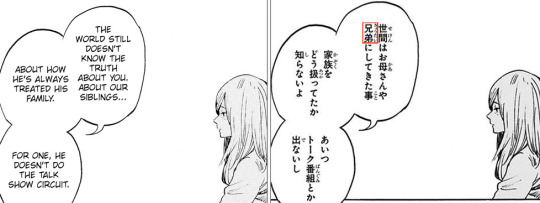
RANDOM EXTRA WORDS USED TO CALL THE TODOROKIS OR USED IN RELATION TO THEM
Todoroki Enji (轟 炎司) aka FLAME HERO: ENDEAVOR (フレイムヒーロー エンデヴァー Flame Hero Endeavor) previously Nenshō-kei HERO “ENDEAVOR” (燃焼系ヒーロー「エンデヴァー」 Combustion Hero ‘Endeavor’)
Quirk: 'HELLFLAME' (ヘルフレイム "Hell flame")
In chap 3 Enji isn't called 'FLAME HERO' but 'Nenshō-kei HERO'. Likely Horikoshi decided to retcon this later on.

In the character presentation for Vol. 30, which is the famous volume which contains "Dabi's Dance" Enji is represented as a gorilla, and the word gorilla is repeated triece as a reference to how 'Todoroki' is written repeating for three times this kanji 車 which means "car" so that as 'todoroku' (轟く) is supposed to mean "to make a big roaring sound", which I guess you can obtain with 3 cars...
GORILLAGORILLAGORILLA (Todorokimoku Enjika) (ゴリラゴリラゴリラ (轟目 炎司科) "Gorilla Gorilla Gorilla (Todorokimoku Enjika)")
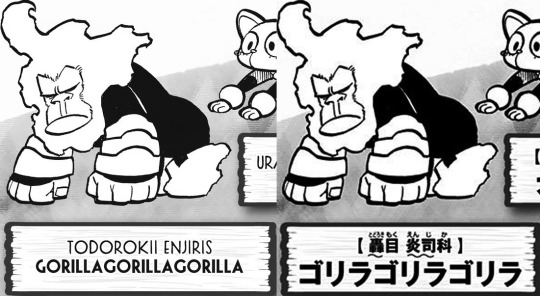
Since the Butsudan in which Enji's father is enshrined is in Enji's house (it's the same in which Tōya is enshrined), Enji was likely a 'chōnan' (長男 "first son") as taking care of the Butsudan in which his father is enshrined is one of the duties of the firstborn.

Enji's sidekicks usually calls Enji just 'Endeavor' not boss or something like that.
His agency though, is named after him 'Edeavor Jimusho' (エンデヴァー事務所 "Endeavor Agency") and his sidekicks go by the collective name of 'Honō no SIDEKICKS' (炎のサイドキッカーズ "Flaming Sidekicks"), their name likely inspired by how he's the flame hero.
Due to his work he's called 'HERO' (ヒーロー) or 'PRO HERO' (プロヒーロー).
Other Heroes call him 'Endeavor' (and he calls them by their Hero name), except for Gran Torino who, in chap 55, calls him 'Todoroki'. Always in chap 55 Enji calls Gran Torino ‘gorōjin’ (ご老人 “honored elder”).
'Go' is another way to read the kanji 御 (the other way being 'o', remember when I said the 'o' added in front of nouns added them a layer of politeness?) while ‘rōjin’ (老人) means "old man". ‘Gorōjin’ which is a bit archaic, as it’s mainly used in samurai dramas.
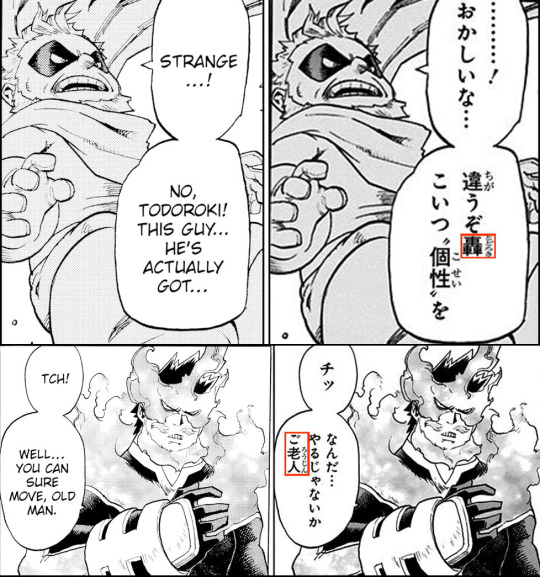
Nezu calls Enji 'Todoroki-kun' (as Enji had been one of his students) while Enji calls him 'kōchō' (校長 "principal").
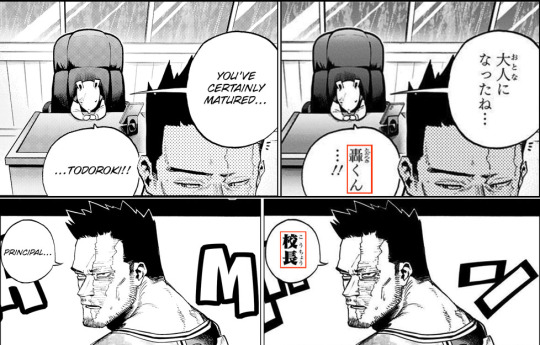
During the manga we don't really get interactions between Enji and Recovery Girl but in "School Briefs" they seem to go on a Hero name basis, him calling her 'Recovery Girl' and she calling him 'Endeavor'.
Todoroki Rei (轟 冷) née Himura Rei (氷叢 冷)
Quirk: 'Hyōketsu' (氷結 "Frost")
It's actually unsure if this is Rei's Quirk true name. The idea it could be comes from the fact Enji said there were no traces of it in Tōya. All we know for sure is it was an ice type Quirk.
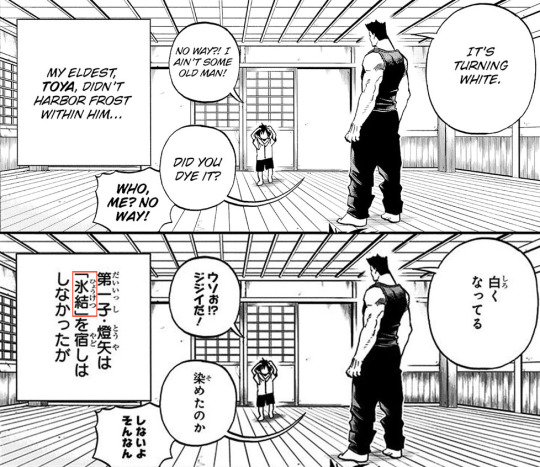
Rei is no more an Himura. When a woman get married in Japan she is striken out of the 'koseki' (戸籍 "family register") of her previous family and gives up on her previous surname so Rei stopped being an Himura after her 'kosei kon' (個性婚 "Quirk marriage").
Still I thought it was worth to mention the Himuras were a 'meika’ (名家) which can be translated as “noble/distinguished family” with a ‘yuisho aru iegara’ (由緒ある家柄) which can be translated “with a prestigious/with a long history social standing/lineage”.
Rei is part of the Himura ‘honke’ (本家 “main household”) literally “source house”. An ‘honke’ is characterized by a patrilocal residence and patrilineal primogeniture and is part of the system of family branching that establishes a multiplied structure to create familial relationships.
The ‘tōshu’ (当主 “family head”) of the Himuras belongs to the main family and is basically the person who has inherited the headship of the family and therefore rules over all the Himura ‘shizoku’ (氏族 “clan”), which are a group of families that are related to each other. This means he has authority over their wife and the rest of the family members and the duty to protect them as well as the right to disown those who violate his wishes. Basically, disobey him and you can be literally kicked out of the family. They also had authority over the family’s customs and rituals and are responsible for the management of the family property and the family business... and is the one who decided of Rei's marriage. Likely he was either Rei's father or grandfather.
In the past the Himura family head was a 'shōya' (庄屋 "village head"), or, more exactly was a person who, during the Edo period (1603-1868), was in charge of the village affairs under the direction of the magistrate and worked as the leader of the village. The term was used predominantly in the Kansai regions (other regions used other names), so we can assume the Himura were originally from that region.
Since the Himura main family ends with Rei's marriage out of the family Rei likely had no male brothers and, possibly was the 'chōjo' (長女 "first daughter") or, if she had a sister, she also was given away in marriage to someone who wasn't an Himura and therefore couldn't carry on the family name.
Todoroki Tōya (轟 燈矢) aka Dabi (荼毘 “Cremation”)
Quirk: 'Sōen' (蒼炎 "Blueflame")
Dabi's Villain name is generally translated as "cremation" but it might be more than just a reference to his power.
It might be a reference to the phrase 'dabi ni fusu' (荼毘に付す "to cremate") which is not really a sentence people use in daily life (in daily life is more common to hear people using 'Kasō' (火葬) to talk about cremation) but that is used in Buddhist funerals. 'Dabi', whose kanji mean 'da' (荼) "suffering"/"harm" and 'bi' (毘) "help" so that it gives a sense of helping from suffering and harm is supposedly an ateji (a word in which either the readings of the individual kanji do not match the reading of the word, or the meanings of the individual kanji do not match the meaning of the word), and it's supposedly derived from 'jhāpita', a word in Pāli, the language of Theravāda Buddhism, which means “was burnt, was set fire to”. This sentence is used only to refer to the process of cremation of the body of the deceased and not to the part related to remembering the deceased at a funeral or moving to a crematorium. It fits with how Tōya's body was assumed to have been cremated by his own flames in that incident and Tōya believes his family has forgotten him.
There's more.
A Japanese proverb says 'Ryūtō Dabi' (竜頭蛇尾 lit. "Dragon Head Snake tail") which means "promising beginning, disappointing end" symbolically referring to the possibility of anticlimax in life, and especially in endeavors. For example one focus so much on achieving a goal that it becomes all-consuming, larger-than-life in importance and value or, one might indeed achieve his great goal, but fail to plan for "what comes next", creating a kind of anti-climax. Horikoshi was aware of this possible connection to Dabi's Villain name as he drew Dabi as a snake in the character presentation for Vol. 30, which is the famous volume which contains "Dabi's Dance". The whole 'Ryūtō Dabi' reference might be referring to Endeavor's efforts to get a masterpiece that would surpass All Might, destroying his family in the process and causing Dabi to return the favour by destroying Endeavor as a Hero, but it can be seen as a reference to Dabi as well as he too has an all consuming goal and no plan for after he'll reach it (as he plans to die).
Dabi Hebi (Damoku Bika) (ダビヘビ (荼目 毘科) Dabi Snake (Damoku Bika))

As said before Tōya's Quirk originally should have been named differently as his flames weren't blue. However, after Geten called his Quirk as such that was acknowledged as its official name. As it turned out Tōya has also some ice Quirk, his Quirk's name migh be changed again.
In the Todoroki family he is the 'chōnan' (長男 "first son"), which, socially, makes him the most "high ranking" child, with a long list of duties he's expected to fulfill also connected to this. Among them there's also to inherit his father's job (and therefore become a Hero). Note that nowadays those duties have a lot less weight that in the past (so that they're more just social expectations that outright duties) but they still exist.
Tōya refers to himself as the 'chōnan' of Endeavor's family when talking to the nation.
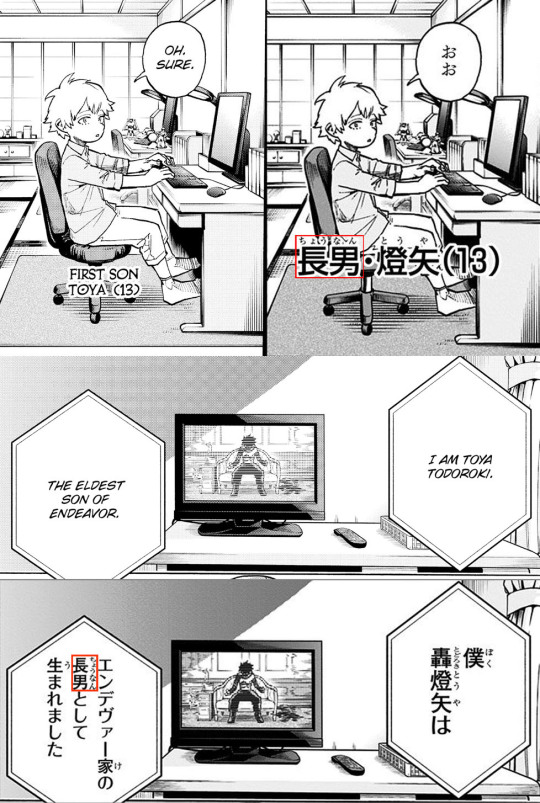
Once he becomes a 'VILLAIN' (敵 "Villain") and joins the 'VILLAIN rengō' (敵連合 "League of Villains") he becomes the 'BOSS' (ボス "boss") of the 'Kaibyaku Kōdō Tai' (開闢行動隊 "Vanguard Action Squad") which in chap 73 he defines as a ‘keiken hōfuna shōsū seiei’ (経験豊富な少数精鋭 “small group of experienced elites”).
Later, when they merge with the 'inō kaihō-gun' (異能解放軍 "Meta Liberation Army") and become the 'chōjō kaihō sensen' (超常解放戦線 "Paranormal Liberation Front") Tōya becomes a 'taichō' (隊長 "commanding officer") of the 'Kaibyaku kōdō yūgeki rentai "VIOLET"' (開闢行動遊撃連隊"VIOLET" "vanguard action guerrilla regiment "violet"").
If Tōya said Shigaraki was ‘kisyoku wariI’/‘kisyoku WARII’ (気色悪イ/気色ワリイ literally “bad charm”, actually “creepy”), and the fact the second time he says 'warii' it's all in katakana works to underline it, in chap 67/68, the Villains he considered recruiting blamed him for having a ‘kimochi wariI kao’ (気持悪イ顔 litterally "bad feeling face", actually "creepy/disgusting face").

In the league everyone calls him 'Dabi' except Himiko who first calls him 'Dabi-kun' and then, post reveal, 'Tōya-kun'. All for One also calls him 'Tōya-kun'.
Although at the beginning Tōya called Shigaraki merely 'Shigaraki' he referred to him as the 'BOSS' (ボス "boss") when he talks with Hawks but, in other circumstances preferred to call him ‘LEADER’ (リーダー "leader")... though he does so in a way that feels more mocking than anything else since, when he does so, he tends to discuss Shigaraki's orders.

As for the other members, he calls Twice 'Twice' (and, despite Twice being Twice I couldn't find a time in which he called him 'ikare') and Mr. Compress just 'Mr.' (same as Himiko while the others prefer 'Compress'). He once called Spinner ‘tokage’ (トカゲ “lizard”) (chap 160) and didn't seem to understand why Spinner took offence to it (canonically in chap 370 and 371 is said that Heteromorph discrimination is something that exists only in the countryside so city heteromorphs like Kōda and Tokoyami as well as city kids like the ones in class 1 A live unaware of it so Tōya, being a city boy same as Shōto, might be unaware of it), while in chap 220 he asks him if he's a ‘karappo no COSPLAY yarō’ (空っぽのコスプレ野郎 “empty cosplayer guy”), likely referring to how Spinner dressed up in a way that mimic Stain but admitted to be empty inside.

If he uses "you" with them, he goes for 'omae'.
With Himiko, as said in the past posts, he is generally more rude, calling her 'ikare (onna/yarō)', 'baka' and using 'temeE' instead than 'omae', the two of them bitching often until in chap 341 he finally calls her 'Toga Himiko' (トガヒミコ) all in kanji as that's Himiko's Villain name and refers to the two of them as 'ore-ra' before going back to use 'temeE' and 'ore-tachi'.

The only person he's somewhat polite is Garaki Kyūdai, whom he calls 'Ujiko-san' as the latter introduced himself to him as "Ujiko Daruma" and for which he uses 'anta' when he has to say "you".

As for the Nōmu, he calls the first ‘Ore shiyō no kaibutsu’ 俺仕様の怪物 “The monster of specificated for me”) and ‘neho-hyan’ (ネホヒャンッ) but he likely meant ‘neko-chan’ (ネコチャン “kitty”) and it was just the radio transmitter which made his words sound weird. In chap 350 though he refers to the Nōmu as ‘shikabane’ (屍 “corpse/dead body that has been abandoned and not buried therefore isn’t shown proper respect”).
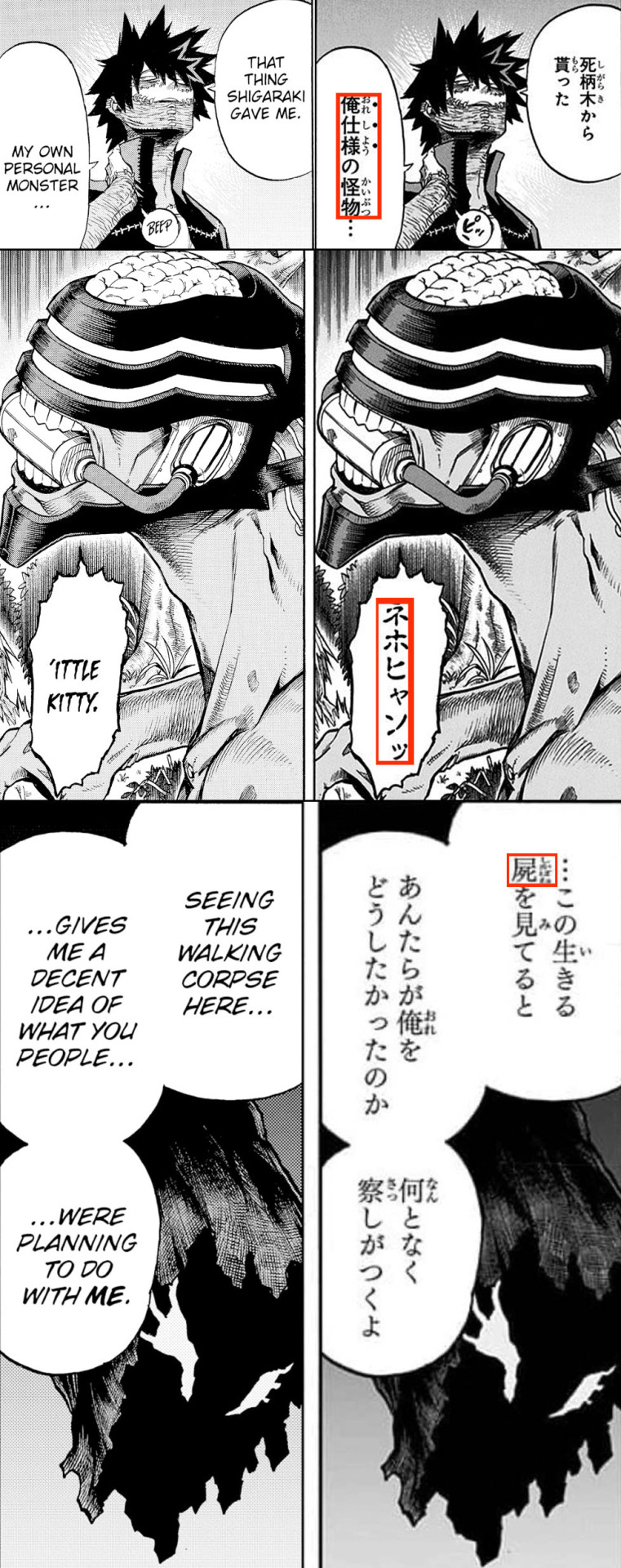
I said 'ikare' is kind of a popular word in the Todoroki family but All Might uses something different to refer to Dabi, calling him 'kyōki no otoko Dabi' (狂気の男荼毘 "insane man Dabi") in chap 335.
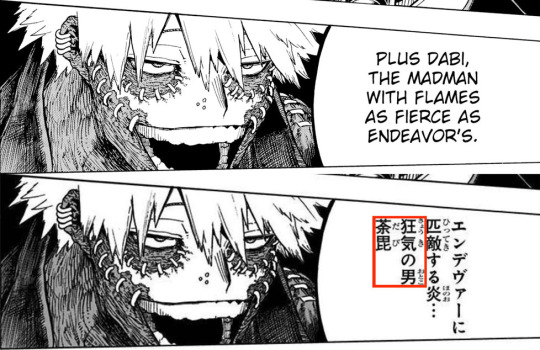
'Kyōki' (狂気 "Insanity") is a common noun that refers to a mental state that deviates from normal, but it is also sometimes used as an arbitrary label by those who use it and that nowadays is commonly used in contexts such as unusual crimes. It's used for something extremely abnormal, for someone whose behavior deviates strongly from normally accepted social norms.
'Ikare' (イカレ/いかれ) instead is a slang term whose origin is the verb 'iku' (行く "to go") as if to imply the mind is gone.
I guess in contest this makes All Might sound more formal/polite than if he had used 'ikare' but I might be wrong.
Todoroki Fuyumi (轟 冬美)
Quirk: 'Hyōketsu' (氷結 "Frost")
It's actually unsure if this is Fuyumi's Quirk true name. The idea it could be comes from the fact it's assumed it's Rei's Quirk's name and that Fuyumi also inherited it, but Fuyumi's Quirk, despite being an ice type Quirk might be slightly different from her mother's and have a different name.
In the Todoroki family she is the 'chōjo' (長女 "first daughter").

In chap 105 Fuyumi explains she is a ''Shōgakkō de sensei' (小学校で先生 "Elementary school teacher") and therefore she's called just 'sensei' or 'Todoroki sensei' by her students.
'Sensei' (先生 lit. "born first") is an honorific which shows respect used for anyone who’s in a position to teach something (in this case it can be translated as “teacher”) or has mastered an art form or some other skill (in this case you can translate it as “master”) or to address other professionals or people of authority, such as clergy, accountants, lawyers, physicians and politicians. All for One is called 'sensei' by Garaki and Shiragaki, but so are the teachers at U.A.
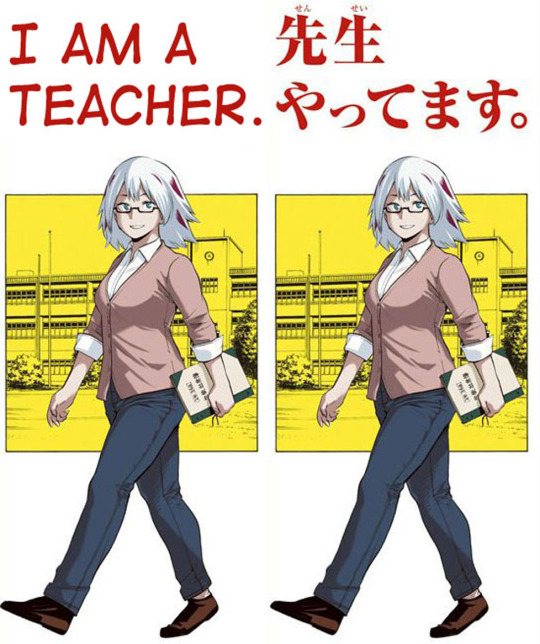
Todoroki Natsuo (轟 夏雄)
Quirk: 'Hyōketsu' (氷結 "Frost")
It's actually unsure if this is Natsuo's Quirk true name. The idea it could be comes from the fact it's assumed it's Rei's Quirk's name and that Natsuo also inherited it, but Natsuo's Quirk, despite being an ice type Quirk might be slightly different from her mother's and have a different name.
In the Todoroki family he is the 'jinan' (次男 "second son")
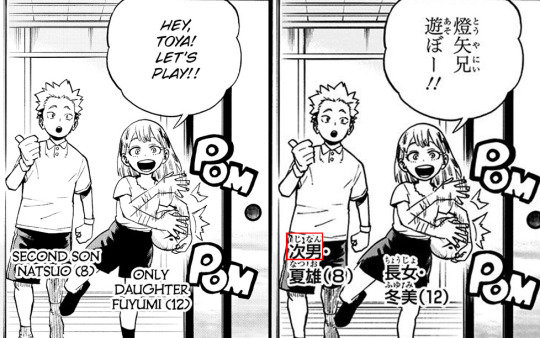
Natsuo is a 'daigakusei' (大学生 "university student") who's studing 'Iryō fukushi' (医療福祉 "medical wellfare").
'Iryō fukushi' is a general term for businesses that provide services related to medical care, health and hygiene, social insurance, and social welfare and nursing care. Occupations include medical assistance, inspection, nursing care and rehabilitation, all of which require specialized qualifications and specialized knowledge.
Todoroki Shōto (轟 焦凍) aka SHŌTO (ショート)
Quirk: 'Hanrei Hannen' (半冷半燃 "Half-Cold Half-Hot")
In the character presentation for Vol. 30, which is the famous volume which contains "Dabi's Dance" Shōto is represented as a cat.
SHŌTOCAT (Todorokimoku Shōtoka) (ショートキャット (轟目 焦凍科) "Shōtocat (Todorokimoku Shōtoka)")
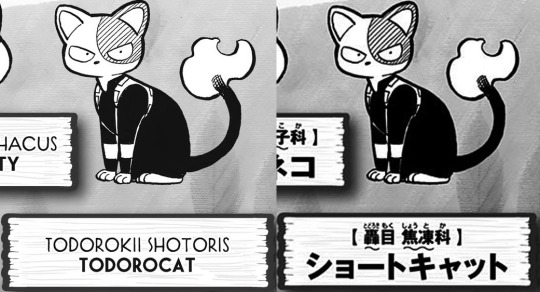
In the Todoroki family he is the 'Sannan' (三男 "third son") and in chap 349 Tōya refers to him as such when talking to himself.

Shōto is currently a 'kōkōsei' (高校生 "high school student") at 'U.A. Kōkō' (雄英高校 "U.A. high school") though people usually refers to him using just as 'gakusei' (学生 "student").
When he was a 'chūgakusei' (中学生 "middle school student") he attended at 'Corusan Chūgakkō' (凝こる山中学校 "Corusan Middle School").
As Shōto is a recurring character probably everyone knows how he addresses to others and how others address to him but I still listed some thing I thought worth being pointed out.
As said before, Shōto calls all his classmates just by their surname, Midoriya (and many others of his classmates) calls him 'Todoroki-kun' while Bakugō has a nice list of insulting nicknames for him, starting with 'kōri no yatsu' (氷の奴) when he thought he only had one Quirk (Chap 11), evolving into 'hanbun yarō’ (半分野郎 lit. “half part guy/half bastard”) when he discovered he had two (Chap 42), until he finally also calls him just 'Todoroki' (Chap 166)... though he's not afraid to define him 'zako' (雑魚 "small fry") (Chap 204) or use other nicknames.
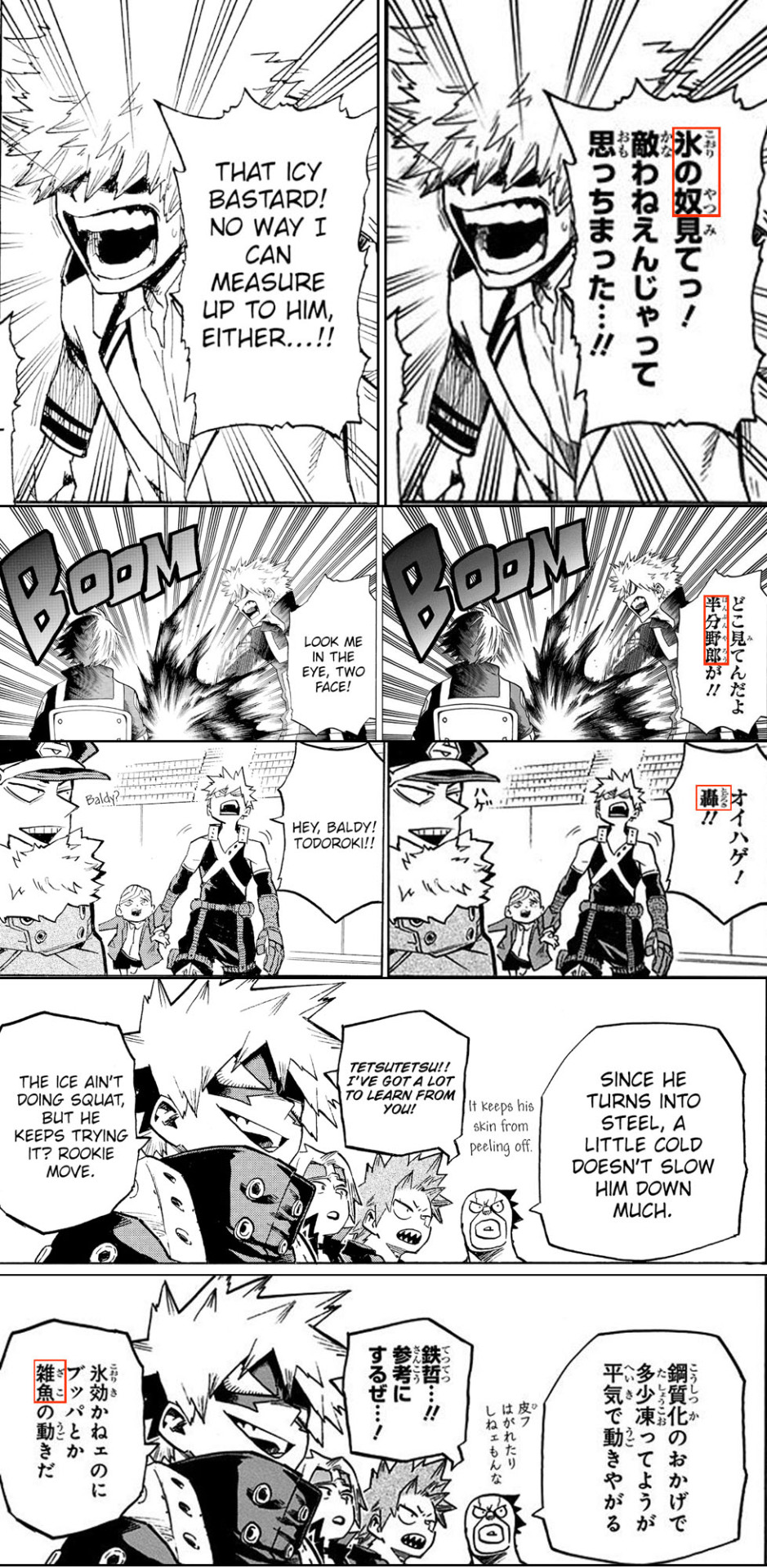
Occasionally Shōto gets nicknames that are based on wordplays that involve a word and the last part of his surname, like how Sero in chap 195 calls Shōto 'Shokiroki-kun' (初期ろき君), a word play between 'shoki' (初期) "early/initial" and 'Todoroki' in a nick that references how he was in the past or how when Bakugō sees the illusionary Shōto Camie created in chap 166 he calls him 'maboroki-kun' (マボロキくん) a word play between 'maboroshi' (幻/まぼろし "illusion") and 'Todoroki'.

All Might calls Shōto 'Todoroki shōnen' (轟少年 "Todoroki boy") while Aizawa calls him just 'Todoroki'. Shōto, same as the other students, calls Aizawa 'sensei' (先生) or 'Aizawa sensei'.
Yoarashi Inasa calls Shōto just 'Todoroki'.
In chap 163 Utsushimi Camie calls him 'Chō ī otoko' (ちょーいい男 "super good looking guy") and 'ikemen' (イケメン), a word of recent creation in which 'ike' (イケ) comes from 'Iketeru' (イケてる) which roughly translates to "cool", "good" where 'men' (メン) can stand both for the English word "men" but also for the Japanese word 'men' (面) which means "face".
Ashido Mina too referred to Shōto as an 'ikemen' in chap 130.

Gang Orca calls him and the other students who're attempting to get a license 'fun' (糞 "poop"). Masegaki elementary students called him 'gochinko' (ゴチンコ "five wienies") (Chap 164-389).

During his 'Shokuba taiken' (職場体験 "work experience") and, later, during his 'HERO INTERN' (ヒーローインターン "hero internship"), Shōto will always go at Endeavor agency where his father's sidecks call him 'Shōto-kun' (ショートくん), therefore using his Hero name even though it's hardly noticeable as it sounds like his name.
Himura ? (氷叢 ?) aka Geten (外 (げ) 典 (てん))
Quirk: Hyōsō (氷操 "Ice Ply")
Supposedly Geten is a Villain name since Re-Destro called his underlings using their Villain names. We don't know his true name, just that he's part of the Himura but, differently from Rei, he comes from a ‘bunke’ (分家 literally “part house”) “branch households”/“branch family”. A ‘bunke’ is created when a child who is not the first born is allowed to form a family of his own. Said family though will remain subservient to the main family (so the main family still keeps control of things) and usually will remain to live close to it.
Geten calls Re-Destro 'Saikō shidō-sha' (最高指導者 "supreme leader") in chap 228 while in chap 238 he uses just 'Re-Destro' and 'anata' with him while Re-Destro calls him 'Geten' and uses 'kimi' with him. Geten is also a 'taichō' (隊長 "commanding officer") of the 'Kaibyaku kōdō yūgeki rentai "VIOLET"' (開闢行動遊撃連隊"VIOLET" "vanguard action guerrilla regiment "violet"").
CONTINUE IN THE NEXT PART!
18 notes
·
View notes
Text

Shouto unintentionally finding a way to piss Touya off the most
57 notes
·
View notes
Note
what do you think the line how sad shoto todoroki meant anything
To Touya, there is an unspoken competition between the two - the masterpiece and the failure. Unspoken because one, Shouto never cared about being the masterpiece or getting their father's attention, two they didn't interact with each other before this, and three because Shouto at that point doesn't even know Touya is alive.
The whole point of Dabi's existence is his desire for his dad's attention, something he knows will only happen if he becomes the masterpiece; in other words beats Shouto, which leads to his original plan of wanting to kill Shouto since that would mean the spot for masterpiece was open again, while simultaneously proving that Touya wasn't a failure, as a true masterpiece shouldn't be able to be defeated (especially not by a failure).
The summer camp is essentially the first round of this unspoken competition - both of them racing to the marble. Touya is, even if only by a split second, faster and thus wins this first round.
"How sad" because Touya winning has two meanings. One, he was right in that he can go up against Shouto, and two, the masterpiece lost against the failure - again, a true masterpiece shouldn't fail against the failure.
All that is to say that Touya getting the marble proved to him that he stands a chance in succeeding with his original plan (killing Shouto) and he's suggesting this win means that Shouto isn't enough of a masterpiece to win.
Bottom line, and this is the real answer: in true sibling fashion, Touya was told he can't physically harm his sibling, so he insults him instead by hitting him with a "suck it, loser!" instead.
#bnha#dabi's one sided sibling rivalry to his brother who's 8 yrs younger is so funny#bc while he's trying to beat shouto shouto is just like “wow my older brother touya is so strong and cool”
56 notes
·
View notes
Text
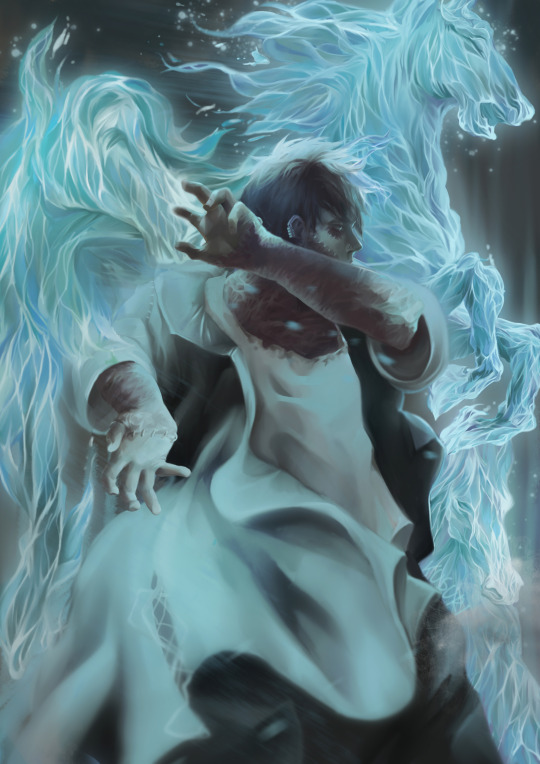
Dabi's hell horses!
Animalistic form of quirks
Pt.1
275 notes
·
View notes
Text


Sketchy sketchy more Soul Eater stuff! :D
Character: Soul Evans from "Soul Eater"
296 notes
·
View notes
Text
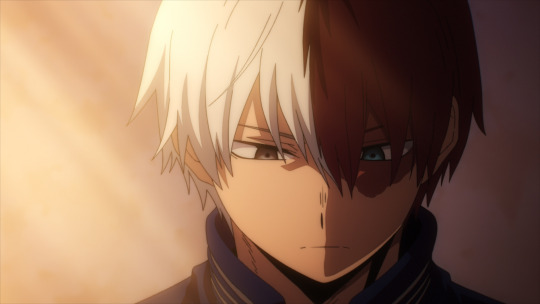

Todoroki brothers preview pictures for the 3rd recap episode
"Memories: Thoughts"
234 notes
·
View notes
